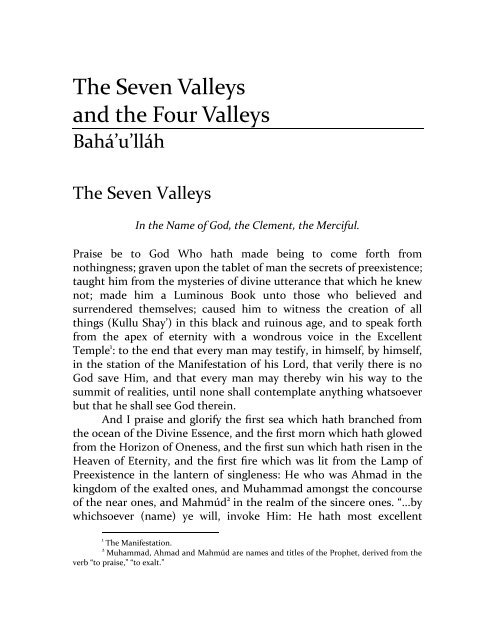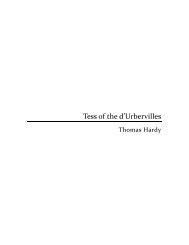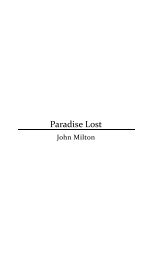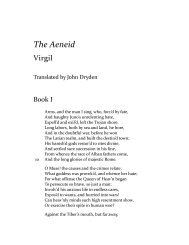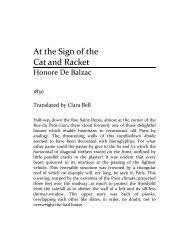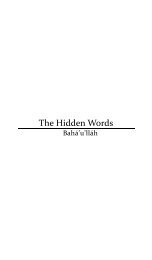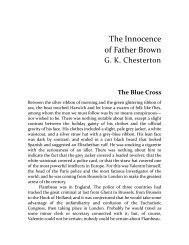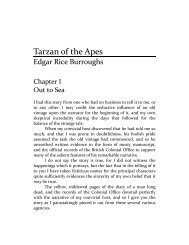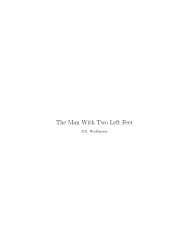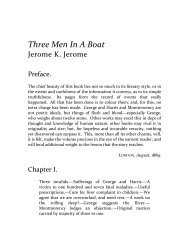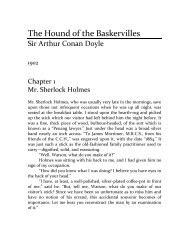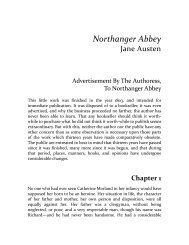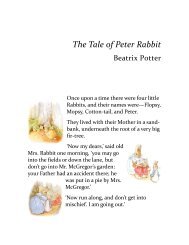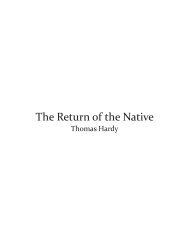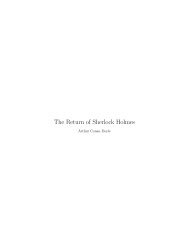Baha'u'llah - The Seven Valleys and the Four Valleys.pdf - Bookstacks
Baha'u'llah - The Seven Valleys and the Four Valleys.pdf - Bookstacks
Baha'u'llah - The Seven Valleys and the Four Valleys.pdf - Bookstacks
You also want an ePaper? Increase the reach of your titles
YUMPU automatically turns print PDFs into web optimized ePapers that Google loves.
<strong>The</strong> <strong>Seven</strong> <strong>Valleys</strong><br />
<strong>and</strong> <strong>the</strong> <strong>Four</strong> <strong>Valleys</strong><br />
Bahá’u’lláh<br />
<strong>The</strong> <strong>Seven</strong> <strong>Valleys</strong><br />
In <strong>the</strong> Name of God, <strong>the</strong> Clement, <strong>the</strong> Merciful.<br />
Praise be to God Who hath made being to come forth from<br />
nothingness; graven upon <strong>the</strong> tablet of man <strong>the</strong> secrets of preexistence;<br />
taught him from <strong>the</strong> mysteries of divine utterance that which he knew<br />
not; made him a Luminous Book unto those who believed <strong>and</strong><br />
surrendered <strong>the</strong>mselves; caused him to witness <strong>the</strong> creation of all<br />
things (Kullu Shay’) in this black <strong>and</strong> ruinous age, <strong>and</strong> to speak forth<br />
from <strong>the</strong> apex of eternity with a wondrous voice in <strong>the</strong> Excellent<br />
Temple 1 : to <strong>the</strong> end that every man may testify, in himself, by himself,<br />
in <strong>the</strong> station of <strong>the</strong> Manifestation of his Lord, that verily <strong>the</strong>re is no<br />
God save Him, <strong>and</strong> that every man may <strong>the</strong>reby win his way to <strong>the</strong><br />
summit of realities, until none shall contemplate anything whatsoever<br />
but that he shall see God <strong>the</strong>rein.<br />
And I praise <strong>and</strong> glorify <strong>the</strong> first sea which hath branched from<br />
<strong>the</strong> ocean of <strong>the</strong> Divine Essence, <strong>and</strong> <strong>the</strong> first morn which hath glowed<br />
from <strong>the</strong> Horizon of Oneness, <strong>and</strong> <strong>the</strong> first sun which hath risen in <strong>the</strong><br />
Heaven of Eternity, <strong>and</strong> <strong>the</strong> first fire which was lit from <strong>the</strong> Lamp of<br />
Preexistence in <strong>the</strong> lantern of singleness: He who was Ahmad in <strong>the</strong><br />
kingdom of <strong>the</strong> exalted ones, <strong>and</strong> Muhammad amongst <strong>the</strong> concourse<br />
of <strong>the</strong> near ones, <strong>and</strong> Mahmúd 2 in <strong>the</strong> realm of <strong>the</strong> sincere ones. “...by<br />
whichsoever (name) ye will, invoke Him: He hath most excellent<br />
1 <strong>The</strong> Manifestation.<br />
2 Muhammad, Ahmad <strong>and</strong> Mahmúd are names <strong>and</strong> titles of <strong>the</strong> Prophet, derived from <strong>the</strong><br />
verb “to praise,” “to exalt.”
names” 3 in <strong>the</strong> hearts of those who know. And upon His household<br />
<strong>and</strong> companions be abundant <strong>and</strong> abiding <strong>and</strong> eternal peace!<br />
Fur<strong>the</strong>r, we have harkened to what <strong>the</strong> nightingale of knowledge<br />
sang on <strong>the</strong> boughs of <strong>the</strong> tree of thy being, <strong>and</strong> learned what <strong>the</strong> dove<br />
of certitude cried on <strong>the</strong> branches of <strong>the</strong> bower of thy heart. Methinks<br />
I verily inhaled <strong>the</strong> pure fragrances of <strong>the</strong> garment of thy love, <strong>and</strong><br />
attained thy very meeting from perusing thy letter. And since I noted<br />
thy mention of thy death in God, <strong>and</strong> thy life through Him, <strong>and</strong> thy<br />
love for <strong>the</strong> beloved of God <strong>and</strong> <strong>the</strong> Manifestations of His Names <strong>and</strong><br />
<strong>the</strong> Dawning-Points of His Attributes—I <strong>the</strong>refore reveal unto <strong>the</strong>e<br />
sacred <strong>and</strong> resplendent tokens from <strong>the</strong> planes of glory, to attract <strong>the</strong>e<br />
into <strong>the</strong> court of holiness <strong>and</strong> nearness <strong>and</strong> beauty, <strong>and</strong> draw <strong>the</strong>e to a<br />
station wherein thou shalt see nothing in creation save <strong>the</strong> Face of thy<br />
Beloved One, <strong>the</strong> Honored, <strong>and</strong> behold all created things only as in <strong>the</strong><br />
day wherein none hath a mention.<br />
Of this hath <strong>the</strong> nightingale of oneness sung in <strong>the</strong> garden of<br />
Ghawthíyyih. 4 He saith: “And <strong>the</strong>re shall appear upon <strong>the</strong> tablet of<br />
thine heart a writing of <strong>the</strong> subtle mysteries of ‘Fear God <strong>and</strong> God will<br />
give you knowledge’; 5 <strong>and</strong> <strong>the</strong> bird of thy soul shall recall <strong>the</strong> holy<br />
sanctuaries of preexistence <strong>and</strong> soar on <strong>the</strong> wings of longing in <strong>the</strong><br />
heaven of ‘walk <strong>the</strong> beaten paths of thy Lord’, 6 <strong>and</strong> ga<strong>the</strong>r <strong>the</strong> fruits of<br />
communion in <strong>the</strong> gardens of ‘<strong>The</strong>n feed on every kind of fruit.’” 7<br />
By My life, O friend, wert thou to taste of <strong>the</strong>se fruits, from <strong>the</strong><br />
green garden of <strong>the</strong>se blossoms which grow in <strong>the</strong> l<strong>and</strong>s of knowledge,<br />
beside <strong>the</strong> orient lights of <strong>the</strong> Essence in <strong>the</strong> mirrors of names <strong>and</strong><br />
attributes—yearning would seize <strong>the</strong> reins of patience <strong>and</strong> reserve<br />
from out thy h<strong>and</strong>, <strong>and</strong> make thy soul to shake with <strong>the</strong> flashing light,<br />
<strong>and</strong> draw <strong>the</strong>e from <strong>the</strong> earthly homel<strong>and</strong> to <strong>the</strong> first, heavenly abode<br />
in <strong>the</strong> Center of Realities, <strong>and</strong> lift <strong>the</strong>e to a plane wherein thou wouldst<br />
soar in <strong>the</strong> air even as thou walkest upon <strong>the</strong> earth, <strong>and</strong> move over <strong>the</strong><br />
water as thou runnest on <strong>the</strong> l<strong>and</strong>. Wherefore, may it rejoice Me, <strong>and</strong><br />
3 Qur’án 17:110.<br />
4 Sermon by ‘Alí.<br />
5 Qur’án 2:282.<br />
6 Qur’án 16:71.<br />
7 Qur’án 16:71.<br />
2
<strong>the</strong>e, <strong>and</strong> whosoever mounteth into <strong>the</strong> heaven of knowledge, <strong>and</strong><br />
whose heart is refreshed by this, that <strong>the</strong> wind of certitude hath blown<br />
over <strong>the</strong> garden of his being, from <strong>the</strong> Sheba of <strong>the</strong> All-Merciful.<br />
Peace be upon him who followeth <strong>the</strong> Right Path!<br />
And fur<strong>the</strong>r: <strong>The</strong> stages that mark <strong>the</strong> wayfarer’s journey from<br />
<strong>the</strong> abode of dust to <strong>the</strong> heavenly homel<strong>and</strong> are said to be seven. Some<br />
have called <strong>the</strong>se <strong>Seven</strong> <strong>Valleys</strong>, <strong>and</strong> o<strong>the</strong>rs, <strong>Seven</strong> Cities. And <strong>the</strong>y say<br />
that until <strong>the</strong> wayfarer taketh leave of self, <strong>and</strong> traverseth <strong>the</strong>se stages,<br />
he shall never reach to <strong>the</strong> ocean of nearness <strong>and</strong> union, nor drink of<br />
<strong>the</strong> peerless wine. <strong>The</strong> first is<br />
<strong>The</strong> Valley of Search<br />
<strong>The</strong> steed of this Valley is patience; without patience <strong>the</strong> wayfarer on<br />
this journey will reach nowhere <strong>and</strong> attain no goal. Nor should he ever<br />
be downhearted; if he strive for a hundred thous<strong>and</strong> years <strong>and</strong> yet fail<br />
to behold <strong>the</strong> beauty of <strong>the</strong> Friend, he should not falter. For those who<br />
seek <strong>the</strong> Ka’bih 8 of “for Us” rejoice in <strong>the</strong> tidings: “In Our ways will We<br />
guide <strong>the</strong>m.” 9 In <strong>the</strong>ir search, <strong>the</strong>y have stoutly girded up <strong>the</strong> loins of<br />
service, <strong>and</strong> seek at every moment to journey from <strong>the</strong> plane of<br />
heedlessness into <strong>the</strong> realm of being. No bond shall hold <strong>the</strong>m back,<br />
<strong>and</strong> no counsel shall deter <strong>the</strong>m.<br />
It is incumbent on <strong>the</strong>se servants that <strong>the</strong>y cleanse <strong>the</strong> heart—<br />
which is <strong>the</strong> wellspring of divine treasures—from every marking, <strong>and</strong><br />
that <strong>the</strong>y turn away from imitation, which is following <strong>the</strong> traces of<br />
<strong>the</strong>ir forefa<strong>the</strong>rs <strong>and</strong> sires, <strong>and</strong> shut <strong>the</strong> door of friendliness <strong>and</strong><br />
enmity upon all <strong>the</strong> people of <strong>the</strong> earth.<br />
In this journey <strong>the</strong> seeker reacheth a stage wherein he seeth all<br />
created things w<strong>and</strong>ering distracted in search of <strong>the</strong> Friend. How many<br />
a Jacob will he see, hunting after his Joseph; he will behold many a<br />
lover, hasting to seek <strong>the</strong> Beloved, he will witness a world of desiring<br />
8 <strong>The</strong> holy Sanctuary at Mecca. Here <strong>the</strong> word means “goal.”<br />
9 Qur’án 29:69: “And whoso maketh efforts for Us, in Our ways will We guide <strong>the</strong>m.”<br />
3
ones searching after <strong>the</strong> One Desired. At every moment he findeth a<br />
weighty matter, in every hour he becometh aware of a mystery; for he<br />
hath taken his heart away from both worlds, <strong>and</strong> set out for <strong>the</strong><br />
Ka’bih 10 of <strong>the</strong> Beloved. At every step, aid from <strong>the</strong> Invisible Realm will<br />
attend him <strong>and</strong> <strong>the</strong> heat of his search will grow.<br />
One must judge of search by <strong>the</strong> st<strong>and</strong>ard of <strong>the</strong> Majnún of<br />
Love. 11 It is related that one day <strong>the</strong>y came upon Majnún sifting <strong>the</strong><br />
dust, <strong>and</strong> his tears flowing down. <strong>The</strong>y said, “What doest thou?” He<br />
said, “I seek for Laylí.” <strong>The</strong>y cried, “Alas for <strong>the</strong>e! Laylí is of pure spirit,<br />
<strong>and</strong> thou seekest her in <strong>the</strong> dust!” He said, “I seek her everywhere;<br />
haply somewhere I shall find her.”<br />
Yea, although to <strong>the</strong> wise it be shameful to seek <strong>the</strong> Lord of<br />
Lords in <strong>the</strong> dust, yet this betokeneth intense ardor in searching.<br />
“Whoso seeketh out a thing with zeal shall find it.” 12<br />
<strong>The</strong> true seeker hunteth naught but <strong>the</strong> object of his quest, <strong>and</strong><br />
<strong>the</strong> lover hath no desire save union with his beloved. Nor shall <strong>the</strong><br />
seeker reach his goal unless he sacrifice all things. That is, whatever he<br />
hath seen, <strong>and</strong> heard, <strong>and</strong> understood, all must he set at naught, that<br />
he may enter <strong>the</strong> realm of <strong>the</strong> spirit, which is <strong>the</strong> City of God. Labor is<br />
needed, if we are to seek Him; ardor is needed, if we are to drink of <strong>the</strong><br />
honey of reunion with Him; <strong>and</strong> if we taste of this cup, we shall cast<br />
away <strong>the</strong> world.<br />
On this journey <strong>the</strong> traveler abideth in every l<strong>and</strong> <strong>and</strong> dwelleth<br />
in every region. In every face, he seeketh <strong>the</strong> beauty of <strong>the</strong> Friend; in<br />
every country he looketh for <strong>the</strong> Beloved. He joineth every company,<br />
<strong>and</strong> seeketh fellowship with every soul, that haply in some mind he<br />
may uncover <strong>the</strong> secret of <strong>the</strong> Friend, or in some face he may behold<br />
<strong>the</strong> beauty of <strong>the</strong> Loved One.<br />
10 <strong>The</strong> holy Sanctuary at Mecca. Here <strong>the</strong> word means “goal.”<br />
11 Literally, Majnún means “insane.” This is <strong>the</strong> title of <strong>the</strong> celebrated lover of ancient<br />
Persian <strong>and</strong> Arabian lore, whose beloved was Laylí, daughter of an Arabian prince. Symbolizing<br />
true human love bordering on <strong>the</strong> divine, <strong>the</strong> story has been made <strong>the</strong> <strong>the</strong>me of many a Persian<br />
romantic poem, particularly that of Nizámí, written in 1188–1189 A.D.<br />
12 Arabian proverb.<br />
4
And if, by <strong>the</strong> help of God, he findeth on this journey a trace of<br />
<strong>the</strong> traceless Friend, <strong>and</strong> inhaleth <strong>the</strong> fragrance of <strong>the</strong> long-lost Joseph<br />
from <strong>the</strong> heavenly messenger, 13 he shall straightway step into<br />
<strong>The</strong> Valley of Love<br />
<strong>and</strong> be dissolved in <strong>the</strong> fire of love. In this city <strong>the</strong> heaven of ecstasy is<br />
upraised <strong>and</strong> <strong>the</strong> world-illuming sun of yearning shineth, <strong>and</strong> <strong>the</strong> fire<br />
of love is ablaze; <strong>and</strong> when <strong>the</strong> fire of love is ablaze, it burneth to ashes<br />
<strong>the</strong> harvest of reason.<br />
Now is <strong>the</strong> traveler unaware of himself, <strong>and</strong> of aught besides<br />
himself. He seeth nei<strong>the</strong>r ignorance nor knowledge, nei<strong>the</strong>r doubt nor<br />
certitude; he knoweth not <strong>the</strong> morn of guidance from <strong>the</strong> night of<br />
error. He fleeth both from unbelief <strong>and</strong> faith, <strong>and</strong> deadly poison is a<br />
balm to him. Wherefore Attár 14 saith:<br />
For <strong>the</strong> infidel, error—for <strong>the</strong> faithful, faith;<br />
For Attár’s heart, an atom of Thy pain.<br />
<strong>The</strong> steed of this Valley is pain; <strong>and</strong> if <strong>the</strong>re be no pain this<br />
journey will never end. In this station <strong>the</strong> lover hath no thought save<br />
<strong>the</strong> Beloved, <strong>and</strong> seeketh no refuge save <strong>the</strong> Friend. At every moment<br />
he offereth a hundred lives in <strong>the</strong> path of <strong>the</strong> Loved One, at every step<br />
he throweth a thous<strong>and</strong> heads at <strong>the</strong> feet of <strong>the</strong> Beloved.<br />
O My Bro<strong>the</strong>r! Until thou enter <strong>the</strong> Egypt of love, thou shalt<br />
never come to <strong>the</strong> Joseph of <strong>the</strong> Beauty of <strong>the</strong> Friend; <strong>and</strong> until, like<br />
Jacob, thou forsake thine outward eyes, thou shalt never open <strong>the</strong> eye<br />
of thine inward being; <strong>and</strong> until thou burn with <strong>the</strong> fire of love, thou<br />
shalt never commune with <strong>the</strong> Lover of Longing.<br />
A lover feareth nothing <strong>and</strong> no harm can come nigh him: Thou<br />
seest him chill in <strong>the</strong> fire <strong>and</strong> dry in <strong>the</strong> sea.<br />
13 Refer to <strong>the</strong> story of Joesph in <strong>the</strong> Qur’án <strong>and</strong> <strong>the</strong> Old Testament.<br />
14 Farídu’d-Dín Attár (ca. 1150–1230 A.D.), <strong>the</strong> great Persian Súfí poet.<br />
5
A lover is he who is chill in hell fire;<br />
A knower is he who is dry in <strong>the</strong> sea. 15<br />
Love accepteth no existence <strong>and</strong> wisheth no life: He seeth life in<br />
death, <strong>and</strong> in shame seeketh glory. To merit <strong>the</strong> madness of love, man<br />
must abound in sanity; to merit <strong>the</strong> bonds of <strong>the</strong> Friend, he must be<br />
full of spirit. Blessed <strong>the</strong> neck that is caught in His noose, happy <strong>the</strong><br />
head that falleth on <strong>the</strong> dust in <strong>the</strong> pathway of His love. Wherefore, O<br />
friend, give up thy self that thou mayest find <strong>the</strong> Peerless One, pass by<br />
this mortal earth that thou mayest seek a home in <strong>the</strong> nest of heaven.<br />
Be as naught, if thou wouldst kindle <strong>the</strong> fire of being <strong>and</strong> be fit for <strong>the</strong><br />
pathway of love.<br />
Love seizeth not upon a living soul,<br />
<strong>The</strong> falcon preyeth not on a dead mouse. 16<br />
Love setteth a world aflame at every turn, <strong>and</strong> he wasteth every<br />
l<strong>and</strong> where he carrieth his banner. Being hath no existence in his<br />
kingdom; <strong>the</strong> wise wield no comm<strong>and</strong> within his realm. <strong>The</strong> leviathan<br />
of love swalloweth <strong>the</strong> master of reason <strong>and</strong> destroyeth <strong>the</strong> lord of<br />
knowledge. He drinketh <strong>the</strong> seven seas, but his heart’s thirst is still<br />
unquenched, <strong>and</strong> he saith, “Is <strong>the</strong>re yet any more?” 17 He shunneth<br />
himself <strong>and</strong> draweth away from all on earth.<br />
Love’s a stranger to earth <strong>and</strong> heaven too;<br />
In him are lunacies seventy-<strong>and</strong>-two. 18<br />
He hath bound a myriad victims in his fetters, wounded a myriad<br />
wise men with his arrow. Know that every redness in <strong>the</strong> world is from<br />
his anger, <strong>and</strong> every paleness in men’s cheeks is from his poison. He<br />
15<br />
Persian mystic poem.<br />
16<br />
Persian mystic poem. Cf. <strong>The</strong> Hidden Words, No. 7, Arabic.<br />
17<br />
Qur’án 50:29.<br />
18<br />
Jalálu’d-Dín Rúmí (1207–1273 A.D.); <strong>The</strong> Mathnaví. Jalálu’d-Dín, called Mawláná (“our<br />
Master”), is <strong>the</strong> greatest of all Persian Súfí poets, <strong>and</strong> founder of <strong>the</strong> Mawlaví “whirling” dervish<br />
order.<br />
6
yieldeth no remedy but death, he walketh not save in <strong>the</strong> valley of <strong>the</strong><br />
shadow; yet sweeter than honey is his venom on <strong>the</strong> lover’s lips, <strong>and</strong><br />
fairer his destruction in <strong>the</strong> seeker’s eyes than a hundred thous<strong>and</strong><br />
lives.<br />
Wherefore must <strong>the</strong> veils of <strong>the</strong> satanic self be burned away at<br />
<strong>the</strong> fire of love, that <strong>the</strong> spirit may be purified <strong>and</strong> cleansed <strong>and</strong> thus<br />
may know <strong>the</strong> station of <strong>the</strong> Lord of <strong>the</strong> Worlds.<br />
Kindle <strong>the</strong> fire of love <strong>and</strong> burn away all things,<br />
<strong>The</strong>n set thy foot into <strong>the</strong> l<strong>and</strong> of <strong>the</strong> lovers. 19<br />
And if, confirmed by <strong>the</strong> Creator, <strong>the</strong> lover escapes from <strong>the</strong><br />
claws of <strong>the</strong> eagle of love, he will enter<br />
<strong>The</strong> Valley of Knowledge<br />
<strong>and</strong> come out of doubt into certitude, <strong>and</strong> turn from <strong>the</strong> darkness of<br />
illusion to <strong>the</strong> guiding light of <strong>the</strong> fear of God. His inner eyes will open<br />
<strong>and</strong> he will privily converse with his Beloved; he will set ajar <strong>the</strong> gate of<br />
truth <strong>and</strong> piety, <strong>and</strong> shut <strong>the</strong> doors of vain imaginings. He in this<br />
station is content with <strong>the</strong> decree of God, <strong>and</strong> seeth war as peace, <strong>and</strong><br />
findeth in death <strong>the</strong> secrets of everlasting life. With inward <strong>and</strong><br />
outward eyes he witnesseth <strong>the</strong> mysteries of resurrection in <strong>the</strong> realms<br />
of creation <strong>and</strong> <strong>the</strong> souls of men, <strong>and</strong> with a pure heart apprehendeth<br />
<strong>the</strong> divine wisdom in <strong>the</strong> endless Manifestations of God. In <strong>the</strong> ocean<br />
he findeth a drop, in a drop he beholdeth <strong>the</strong> secrets of <strong>the</strong> sea.<br />
Split <strong>the</strong> atom’s heart, <strong>and</strong> lo!<br />
Within it thou wilt find a sun. 20<br />
19 From an ode by Bahá’u’lláh.<br />
20 Qur’án 67:3.<br />
7
<strong>The</strong> wayfarer in this Valley seeth in <strong>the</strong> fashionings of <strong>the</strong> True<br />
One nothing save clear providence, <strong>and</strong> at every moment saith: “No<br />
defect canst thou see in <strong>the</strong> creation of <strong>the</strong> God of Mercy: Repeat <strong>the</strong><br />
gaze: Seest thou a single flaw?” 21 He beholdeth justice in injustice, <strong>and</strong><br />
in justice, grace. In ignorance he findeth many a knowledge hidden,<br />
<strong>and</strong> in knowledge a myriad wisdoms manifest. He breaketh <strong>the</strong> cage of<br />
<strong>the</strong> body <strong>and</strong> <strong>the</strong> passions, <strong>and</strong> consorteth with <strong>the</strong> people of <strong>the</strong><br />
immortal realm. He mounteth on <strong>the</strong> ladders of inner truth <strong>and</strong><br />
hasteneth to <strong>the</strong> heaven of inner significance. He rideth in <strong>the</strong> ark of<br />
“we shall show <strong>the</strong>m our signs in <strong>the</strong> regions <strong>and</strong> in <strong>the</strong>mselves,” 22 <strong>and</strong><br />
journeyeth over <strong>the</strong> sea of “until it become plain to <strong>the</strong>m that (this<br />
Book) is <strong>the</strong> truth.” 23 And if he meeteth with injustice he shall have<br />
patience, <strong>and</strong> if he cometh upon wrath he shall manifest love.<br />
<strong>The</strong>re was once a lover who had sighed for long years in<br />
separation from his beloved, <strong>and</strong> wasted in <strong>the</strong> fire of remoteness.<br />
From <strong>the</strong> rule of love, his heart was empty of patience, <strong>and</strong> his body<br />
weary of his spirit; he reckoned life without her as a mockery, <strong>and</strong> time<br />
consumed him away. How many a day he found no rest in longing for<br />
her; how many a night <strong>the</strong> pain of her kept him from sleep; his body<br />
was worn to a sigh, his heart’s wound had turned him to a cry of<br />
sorrow. He had given a thous<strong>and</strong> lives for one taste of <strong>the</strong> cup of her<br />
presence, but it availed him not. <strong>The</strong> doctors knew no cure for him,<br />
<strong>and</strong> companions avoided his company; yea, physicians have no<br />
medicine for one sick of love, unless <strong>the</strong> favor of <strong>the</strong> beloved one<br />
deliver him.<br />
At last, <strong>the</strong> tree of his longing yielded <strong>the</strong> fruit of despair, <strong>and</strong><br />
<strong>the</strong> fire of his hope fell to ashes. <strong>The</strong>n one night he could live no more,<br />
<strong>and</strong> he went out of his house <strong>and</strong> made for <strong>the</strong> marketplace. On a<br />
sudden, a watchman followed after him. He broke into a run, with <strong>the</strong><br />
watchman following; <strong>the</strong>n o<strong>the</strong>r watchmen came toge<strong>the</strong>r, <strong>and</strong> barred<br />
every passage to <strong>the</strong> weary one. And <strong>the</strong> wretched one cried from his<br />
heart, <strong>and</strong> ran here <strong>and</strong> <strong>the</strong>re, <strong>and</strong> moaned to himself: “Surely this<br />
21 Qur’án 67:3.<br />
22 Qur’án 41:53.<br />
23 Qur’án 41:53.<br />
8
watchman is Izrá’íl, my angel of death, following so fast upon me; or he<br />
is a tyrant of men, seeking to harm me.” His feet carried him on, <strong>the</strong><br />
one bleeding with <strong>the</strong> arrow of love, <strong>and</strong> his heart lamented. <strong>The</strong>n he<br />
came to a garden wall, <strong>and</strong> with untold pain he scaled it, for it proved<br />
very high; <strong>and</strong> forgetting his life, he threw himself down to <strong>the</strong> garden.<br />
And <strong>the</strong>re he beheld his beloved with a lamp in her h<strong>and</strong>,<br />
searching for a ring she had lost. When <strong>the</strong> heart-surrendered lover<br />
looked on his ravishing love, he drew a great breath <strong>and</strong> raised up his<br />
h<strong>and</strong>s in prayer, crying: “O God! Give Thou glory to <strong>the</strong> watchman,<br />
<strong>and</strong> riches <strong>and</strong> long life. For <strong>the</strong> watchman was Gabriel, guiding this<br />
poor one; or he was Isráfíl, bringing life to this wretched one!”<br />
Indeed, his words were true, for he had found many a secret<br />
justice in this seeming tyranny of <strong>the</strong> watchman, <strong>and</strong> seen how many a<br />
mercy lay hid behind <strong>the</strong> veil. Out of wrath, <strong>the</strong> guard had led him<br />
who was athirst in love’s desert to <strong>the</strong> sea of his loved one, <strong>and</strong> lit up<br />
<strong>the</strong> dark night of absence with <strong>the</strong> light of reunion. He had driven one<br />
who was afar, into <strong>the</strong> garden of nearness, had guided an ailing soul to<br />
<strong>the</strong> heart’s physician.<br />
Now if <strong>the</strong> lover could have looked ahead, he would have blessed<br />
<strong>the</strong> watchman at <strong>the</strong> start, <strong>and</strong> prayed on his behalf, <strong>and</strong> he would<br />
have seen that tyranny as justice; but since <strong>the</strong> end was veiled to him,<br />
he moaned <strong>and</strong> made his plaint in <strong>the</strong> beginning. Yet those who<br />
journey in <strong>the</strong> garden l<strong>and</strong> of knowledge, because <strong>the</strong>y see <strong>the</strong> end in<br />
<strong>the</strong> beginning, see peace in war <strong>and</strong> friendliness in anger.<br />
Such is <strong>the</strong> state of <strong>the</strong> wayfarers in this Valley; but <strong>the</strong> people of<br />
<strong>the</strong> <strong>Valleys</strong> above this see <strong>the</strong> end <strong>and</strong> <strong>the</strong> beginning as one; nay, <strong>the</strong>y<br />
see nei<strong>the</strong>r beginning nor end, <strong>and</strong> witness nei<strong>the</strong>r “first” nor “last.” 24<br />
Nay ra<strong>the</strong>r, <strong>the</strong> denizens of <strong>the</strong> undying city, who dwell in <strong>the</strong> green<br />
garden l<strong>and</strong>, see not even “nei<strong>the</strong>r first nor last”; <strong>the</strong>y fly from all that<br />
is first, <strong>and</strong> repulse all that is last. For <strong>the</strong>se have passed over <strong>the</strong><br />
worlds of names, <strong>and</strong> fled beyond <strong>the</strong> worlds of attributes as swift as<br />
lightning. Thus is it said: “Absolute Unity excludeth all attributes.” 25<br />
And <strong>the</strong>y have made <strong>the</strong>ir dwelling-place in <strong>the</strong> shadow of <strong>the</strong> Essence.<br />
24 Qur’án 57:3.<br />
25 Saying attributed to ‘Alí.<br />
9
Wherefore, relevant to this, Khájih ‘Abdu’lláh 26 —may God <strong>the</strong><br />
Most High sanctify his beloved spirit—hath made a subtle point <strong>and</strong><br />
spoken an eloquent word as to <strong>the</strong> meaning of “Guide Thou us on <strong>the</strong><br />
straight path,” 27 which is: “Show us <strong>the</strong> right way, that is, honor us with<br />
<strong>the</strong> love of Thine Essence, that we may be freed from turning toward<br />
ourselves <strong>and</strong> toward all else save <strong>The</strong>e, <strong>and</strong> may become wholly<br />
Thine, <strong>and</strong> know only <strong>The</strong>e, <strong>and</strong> see only <strong>The</strong>e, <strong>and</strong> think of none save<br />
<strong>The</strong>e.”<br />
Nay, <strong>the</strong>se even mount above this station, wherefore it is said:<br />
Love is a veil betwixt <strong>the</strong> lover <strong>and</strong> <strong>the</strong> loved one;<br />
More than this I am not permitted to tell. 28<br />
At this hour <strong>the</strong> morn of knowledge hath arisen <strong>and</strong> <strong>the</strong> lamps of<br />
wayfaring <strong>and</strong> w<strong>and</strong>ering are quenched. 29<br />
Veiled from this was Moses<br />
Though all strength <strong>and</strong> light;<br />
<strong>The</strong>n thou who hast no wings at all,<br />
Attempt not flight. 30<br />
If thou be a man of communion <strong>and</strong> prayer, soar up on <strong>the</strong> wings<br />
of assistance from Holy Souls, that thou mayest behold <strong>the</strong> mysteries<br />
of <strong>the</strong> Friend <strong>and</strong> attain to <strong>the</strong> lights of <strong>the</strong> Beloved, “Verily, we are<br />
from God <strong>and</strong> to Him shall we return.” 31<br />
26<br />
Shaykh Abú Ismá’íl ‘Abdu’lláh Ansárí of Hirát (1006–1088 A.D.) Súfí leader, descended<br />
from <strong>the</strong> Prophet’s companion Abú Ayyúb. Chiefly known for his Munáját (Supplications) <strong>and</strong><br />
Rubá’íyyát (Quatrains). “Ansár” means <strong>the</strong> “Helpers” or companions of Muhammad in Medina.<br />
27<br />
Qur’án 1:5.<br />
28<br />
<strong>The</strong> Mathnaví.<br />
29<br />
This refers to <strong>the</strong> mystic w<strong>and</strong>ering <strong>and</strong> search for truth guided by “Lights” or Súfí<br />
leaders. Bahá’u’lláh here warns <strong>the</strong> mystics that <strong>the</strong> coming of <strong>the</strong> Divine Manifestation in His Day<br />
makes fur<strong>the</strong>r search unnecessary, as it was said by ‘Alí: “Quench <strong>the</strong> lamp when <strong>the</strong> sun hath<br />
risen”—<strong>the</strong> sun referring to <strong>the</strong> Manifestation of God in <strong>the</strong> New Day.<br />
30<br />
<strong>The</strong> Mathnaví.<br />
31 Qur’án 2:151.<br />
10
After passing through <strong>the</strong> Valley of knowledge, which is <strong>the</strong> last<br />
plane of limitation, <strong>the</strong> wayfarer cometh to<br />
<strong>The</strong> Valley of Unity<br />
<strong>and</strong> drinketh from <strong>the</strong> cup of <strong>the</strong> Absolute, <strong>and</strong> gazeth on <strong>the</strong><br />
Manifestations of Oneness. In this station he pierceth <strong>the</strong> veils of<br />
plurality, fleeth from <strong>the</strong> worlds of <strong>the</strong> flesh, <strong>and</strong> ascendeth into <strong>the</strong><br />
heaven of singleness. With <strong>the</strong> ear of God he heareth, with <strong>the</strong> eye of<br />
God he beholdeth <strong>the</strong> mysteries of divine creation. He steppeth into<br />
<strong>the</strong> sanctuary of <strong>the</strong> Friend, <strong>and</strong> shareth as an intimate <strong>the</strong> pavilion of<br />
<strong>the</strong> Loved One. He stretcheth out <strong>the</strong> h<strong>and</strong> of truth from <strong>the</strong> sleeve of<br />
<strong>the</strong> Absolute; he revealeth <strong>the</strong> secrets of power. He seeth in himself<br />
nei<strong>the</strong>r name nor fame nor rank, but findeth his own praise in praising<br />
God. He beholdeth in his own name <strong>the</strong> name of God; to him, “all<br />
songs are from <strong>the</strong> King,” 32 <strong>and</strong> every melody from Him. He sitteth on<br />
<strong>the</strong> throne of “Say, all is from God,” 33 <strong>and</strong> taketh his rest on <strong>the</strong> carpet<br />
of “<strong>The</strong>re is no power or might but in God.” 34 He looketh on all things<br />
with <strong>the</strong> eye of oneness, <strong>and</strong> seeth <strong>the</strong> brilliant rays of <strong>the</strong> divine sun<br />
shining from <strong>the</strong> dawning-point of Essence alike on all created things,<br />
<strong>and</strong> <strong>the</strong> lights of singleness reflected over all creation.<br />
It is clear to thine Eminence that all <strong>the</strong> variations which <strong>the</strong><br />
wayfarer in <strong>the</strong> stages of his journey beholdeth in <strong>the</strong> realms of being,<br />
proceed from his own vision. We shall give an example of this, that its<br />
meaning may become fully clear: Consider <strong>the</strong> visible sun; although it<br />
shineth with one radiance upon all things, <strong>and</strong> at <strong>the</strong> behest of <strong>the</strong><br />
King of Manifestation bestoweth light on all creation, yet in each place<br />
it becometh manifest <strong>and</strong> sheddeth its bounty according to <strong>the</strong><br />
potentialities of that place. For instance, in a mirror it reflecteth its<br />
own disk <strong>and</strong> shape, <strong>and</strong> this is due to <strong>the</strong> sensitivity of <strong>the</strong> mirror; in a<br />
crystal it maketh fire to appear, <strong>and</strong> in o<strong>the</strong>r things it showeth only <strong>the</strong><br />
32 <strong>The</strong> Mathnaví.<br />
33 Qur’án 4:80.<br />
34 Qur’án 18:37.<br />
11
effect of its shining, but not its full disk. And yet, through that effect,<br />
by <strong>the</strong> comm<strong>and</strong> of <strong>the</strong> Creator, it traineth each thing according to <strong>the</strong><br />
quality of that thing, as thou observest.<br />
In like manner, colors become visible in every object according<br />
to <strong>the</strong> nature of that object. For instance, in a yellow globe, <strong>the</strong> rays<br />
shine yellow; in a white <strong>the</strong> rays are white; <strong>and</strong> in a red, <strong>the</strong> red rays<br />
are manifest. <strong>The</strong>n <strong>the</strong>se variations are from <strong>the</strong> object, not from <strong>the</strong><br />
shining light. And if a place be shut away from <strong>the</strong> light, as by walls or<br />
a roof, it will be entirely bereft of <strong>the</strong> splendor of <strong>the</strong> light, nor will <strong>the</strong><br />
sun shine <strong>the</strong>reon.<br />
Thus it is that certain invalid souls have confined <strong>the</strong> l<strong>and</strong>s of<br />
knowledge within <strong>the</strong> wall of self <strong>and</strong> passion, <strong>and</strong> clouded <strong>the</strong>m with<br />
ignorance <strong>and</strong> blindness, <strong>and</strong> have been veiled from <strong>the</strong> light of <strong>the</strong><br />
mystic sun <strong>and</strong> <strong>the</strong> mysteries of <strong>the</strong> Eternal Beloved; <strong>the</strong>y have strayed<br />
afar from <strong>the</strong> jewelled wisdom of <strong>the</strong> lucid Faith of <strong>the</strong> Lord of<br />
Messengers, have been shut out of <strong>the</strong> sanctuary of <strong>the</strong> All-Beauteous<br />
One, <strong>and</strong> banished from <strong>the</strong> Ka’bih 35 of splendor. Such is <strong>the</strong> worth of<br />
<strong>the</strong> people of this age!<br />
And if a nightingale 36 soar upward from <strong>the</strong> clay of self <strong>and</strong> dwell<br />
in <strong>the</strong> rose bower of <strong>the</strong> heart, <strong>and</strong> in Arabian melodies <strong>and</strong> sweet<br />
Íránian songs recount <strong>the</strong> mysteries of God—a single word of which<br />
quickeneth to fresh, new life <strong>the</strong> bodies of <strong>the</strong> dead, <strong>and</strong> bestoweth <strong>the</strong><br />
Holy Spirit upon <strong>the</strong> moldering bones of this existence—thou wilt<br />
behold a thous<strong>and</strong> claws of envy, a myriad beaks of rancor hunting<br />
after Him <strong>and</strong> with all <strong>the</strong>ir power intent upon His death.<br />
Yea, to <strong>the</strong> beetle a sweet fragrance seemeth foul, <strong>and</strong> to <strong>the</strong> man<br />
sick of a rheum a pleasant perfume is as naught. Wherefore, it hath<br />
been said for <strong>the</strong> guidance of <strong>the</strong> ignorant:<br />
Cleanse thou <strong>the</strong> rheum from out thine head<br />
And brea<strong>the</strong> <strong>the</strong> breath of God instead. 37<br />
35 <strong>The</strong> holy Sanctuary at Mecca. Here <strong>the</strong> word means “goal.”<br />
36 This refers to Bahá’u’lláh’s own Manifestation.<br />
37 <strong>The</strong> Mathnaví.<br />
12
In sum, <strong>the</strong> differences in objects have now been made plain.<br />
Thus when <strong>the</strong> wayfarer gazeth only upon <strong>the</strong> place of appearance—<br />
that is, when he seeth only <strong>the</strong> many-colored globes—he beholdeth<br />
yellow <strong>and</strong> red <strong>and</strong> white; hence it is that conflict hath prevailed<br />
among <strong>the</strong> creatures, <strong>and</strong> a darksome dust from limited souls hath hid<br />
<strong>the</strong> world. And some do gaze upon <strong>the</strong> effulgence of <strong>the</strong> light; <strong>and</strong><br />
some have drunk of <strong>the</strong> wine of oneness <strong>and</strong> <strong>the</strong>se see nothing but <strong>the</strong><br />
sun itself.<br />
Thus, for that <strong>the</strong>y move on <strong>the</strong>se three differing planes, <strong>the</strong><br />
underst<strong>and</strong>ing <strong>and</strong> <strong>the</strong> words of <strong>the</strong> wayfarers have differed; <strong>and</strong> hence<br />
<strong>the</strong> sign of conflict doth continually appear on earth. For some <strong>the</strong>re<br />
are who dwell upon <strong>the</strong> plane of oneness <strong>and</strong> speak of that world, <strong>and</strong><br />
some inhabit <strong>the</strong> realms of limitation, <strong>and</strong> some <strong>the</strong> grades of self,<br />
while o<strong>the</strong>rs are completely veiled. Thus do <strong>the</strong> ignorant people of <strong>the</strong><br />
day, who have no portion of <strong>the</strong> radiance of Divine Beauty, make<br />
certain claims, <strong>and</strong> in every age <strong>and</strong> cycle inflict on <strong>the</strong> people of <strong>the</strong><br />
sea of oneness what <strong>the</strong>y <strong>the</strong>mselves deserve. “Should God punish men<br />
for <strong>the</strong>ir perverse doings, He would not leave on earth a moving thing!<br />
But to an appointed term doth He respite <strong>the</strong>m....” 38<br />
O My Bro<strong>the</strong>r! A pure heart is as a mirror; cleanse it with <strong>the</strong><br />
burnish of love <strong>and</strong> severance from all save God, that <strong>the</strong> true sun may<br />
shine within it <strong>and</strong> <strong>the</strong> eternal morning dawn. <strong>The</strong>n wilt thou clearly<br />
see <strong>the</strong> meaning of “Nei<strong>the</strong>r doth My earth nor My heaven contain Me,<br />
but <strong>the</strong> heart of My faithful servant containeth Me.” 39 And thou wilt<br />
take up thy life in thine h<strong>and</strong>, <strong>and</strong> with infinite longing cast it before<br />
<strong>the</strong> new Beloved One.<br />
Whensoever <strong>the</strong> light of Manifestation of <strong>the</strong> King of Oneness<br />
settleth upon <strong>the</strong> throne of <strong>the</strong> heart <strong>and</strong> soul, His shining becometh<br />
visible in every limb <strong>and</strong> member. At that time <strong>the</strong> mystery of <strong>the</strong><br />
famed tradition gleameth out of <strong>the</strong> darkness: “A servant is drawn unto<br />
Me in prayer until I answer him; <strong>and</strong> when I have answered him, I<br />
become <strong>the</strong> ear wherewith he heareth....” For thus <strong>the</strong> Master of <strong>the</strong><br />
38 Qur’án 16:63.<br />
39 Hadíth, i.e. action or utterance traditionally attributed to <strong>the</strong> Prophet Muhammad or to<br />
one of <strong>the</strong> holy Imáms.<br />
13
house hath appeared within His home, <strong>and</strong> all <strong>the</strong> pillars of <strong>the</strong><br />
dwelling are ashine with His light. And <strong>the</strong> action <strong>and</strong> effect of <strong>the</strong><br />
light are from <strong>the</strong> Light-Giver; so it is that all move through Him <strong>and</strong><br />
arise by His will. And this is that spring whereof <strong>the</strong> near ones drink, as<br />
it is said: “A fount whereof <strong>the</strong> near unto God shall drink....” 40<br />
However, let none construe <strong>the</strong>se utterances to be<br />
anthropomorphism, nor see in <strong>the</strong>m <strong>the</strong> descent of <strong>the</strong> worlds of God<br />
into <strong>the</strong> grades of <strong>the</strong> creatures; nor should <strong>the</strong>y lead thine Eminence<br />
to such assumptions. For God is, in His Essence, holy above ascent <strong>and</strong><br />
descent, entrance <strong>and</strong> exit; He hath through all eternity been free of<br />
<strong>the</strong> attributes of human creatures, <strong>and</strong> ever will remain so. No man<br />
hath ever known Him; no soul hath ever found <strong>the</strong> pathway to His<br />
Being. Every mystic knower hath w<strong>and</strong>ered far astray in <strong>the</strong> valley of<br />
<strong>the</strong> knowledge of Him; every saint hath lost his way in seeking to<br />
comprehend His Essence. Sanctified is He above <strong>the</strong> underst<strong>and</strong>ing of<br />
<strong>the</strong> wise; exalted is He above <strong>the</strong> knowledge of <strong>the</strong> knowing! <strong>The</strong> way<br />
is barred <strong>and</strong> to seek it is impiety; His proof is His signs; His being is<br />
His evidence. 41<br />
Wherefore, <strong>the</strong> lovers of <strong>the</strong> face of <strong>the</strong> Beloved have said: “O<br />
Thou, <strong>the</strong> One Whose Essence alone showeth <strong>the</strong> way to His Essence,<br />
<strong>and</strong> Who is sanctified above any likeness to His creatures.” 42 How can<br />
utter nothingness gallop its steed in <strong>the</strong> field of preexistence, or a<br />
fleeting shadow reach to <strong>the</strong> everlasting sun? <strong>The</strong> Friend 43 hath said,<br />
“But for <strong>The</strong>e, we had not known <strong>The</strong>e,” <strong>and</strong> <strong>the</strong> Beloved 44 hath said,<br />
“nor attained Thy presence.”<br />
Yea, <strong>the</strong>se mentionings that have been made of <strong>the</strong> grades of<br />
knowledge relate to <strong>the</strong> knowledge of <strong>the</strong> Manifestations of that Sun of<br />
Reality, which casteth Its light upon <strong>the</strong> Mirrors. And <strong>the</strong> splendor of<br />
that light is in <strong>the</strong> hearts, yet it is hidden under <strong>the</strong> veilings of sense<br />
<strong>and</strong> <strong>the</strong> conditions of this earth, even as a c<strong>and</strong>le within a lantern of<br />
40 Qur’án 83:28.<br />
41 Sermon by ‘Alí.<br />
42 Hadíth, i.e. action or utterance traditionally attributed to <strong>the</strong> Prophet Muhammad or to<br />
one of <strong>the</strong> holy Imáms.<br />
43 <strong>The</strong> Prophet Muhammad.<br />
44 <strong>The</strong> Prophet Muhammad.<br />
14
iron, <strong>and</strong> only when <strong>the</strong> lantern is removed doth <strong>the</strong> light of <strong>the</strong> c<strong>and</strong>le<br />
shine out.<br />
In like manner, when thou strippest <strong>the</strong> wrappings of illusion<br />
from off thine heart, <strong>the</strong> lights of oneness will be made manifest.<br />
<strong>The</strong>n it is clear that even for <strong>the</strong> rays <strong>the</strong>re is nei<strong>the</strong>r entrance<br />
nor exit—how much less for that Essence of Being <strong>and</strong> that longed-for<br />
Mystery. O My Bro<strong>the</strong>r, journey upon <strong>the</strong>se planes in <strong>the</strong> spirit of<br />
search, not in blind imitation. A true wayfarer will not be kept back by<br />
<strong>the</strong> bludgeon of words nor debarred by <strong>the</strong> warning of allusions.<br />
How shall a curtain part <strong>the</strong> lover <strong>and</strong> <strong>the</strong> loved one?<br />
Not Alex<strong>and</strong>er’s wall can separate <strong>the</strong>m! 45<br />
Secrets are many, but strangers are myriad. Volumes will not<br />
suffice to hold <strong>the</strong> mystery of <strong>the</strong> Beloved One, nor can it be exhausted<br />
in <strong>the</strong>se pages, although it be no more than a word, no more than a<br />
sign. “Knowledge is a single point, but <strong>the</strong> ignorant have multiplied<br />
it.” 46<br />
On this same basis, ponder likewise <strong>the</strong> differences among <strong>the</strong><br />
worlds. Although <strong>the</strong> divine worlds be never ending, yet some refer to<br />
<strong>the</strong>m as four: <strong>The</strong> world of time (zamán), which is <strong>the</strong> one that hath<br />
both a beginning <strong>and</strong> an end; <strong>the</strong> world of duration (dahr), which hath<br />
a beginning, but whose end is not revealed; <strong>the</strong> world of perpetuity<br />
(sarmad), whose beginning is not to be seen but which is known to<br />
have an end; <strong>and</strong> <strong>the</strong> world of eternity (azal), nei<strong>the</strong>r a beginning nor<br />
an end of which is visible. Although <strong>the</strong>re are many differing<br />
statements as to <strong>the</strong>se points, to recount <strong>the</strong>m in detail would result in<br />
weariness. Thus, some have said that <strong>the</strong> world of perpetuity hath<br />
nei<strong>the</strong>r beginning nor end, <strong>and</strong> have named <strong>the</strong> world of eternity as<br />
<strong>the</strong> invisible, impregnable Empyrean. O<strong>the</strong>rs have called <strong>the</strong>se <strong>the</strong><br />
worlds of <strong>the</strong> Heavenly Court (Lahút), of <strong>the</strong> Empyrean Heaven<br />
45<br />
Háfiz: Shamsu’d-Dín Muhammad, of Shíráz, died ca. 1389 A.D. One of <strong>the</strong> greatest of<br />
Persian poets.<br />
46<br />
Hadíth, i.e. action or utterance traditionally attributed to <strong>the</strong> Prophet Muhammad or to<br />
one of <strong>the</strong> holy Imáms.<br />
15
(Jabarút), of <strong>the</strong> Kingdom of <strong>the</strong> Angels (Malakút), <strong>and</strong> of <strong>the</strong> mortal<br />
world (Násút).<br />
<strong>The</strong> journeys in <strong>the</strong> pathway of love are reckoned as four: From<br />
<strong>the</strong> creatures to <strong>the</strong> True One; from <strong>the</strong> True One to <strong>the</strong> creatures;<br />
from <strong>the</strong> creatures to <strong>the</strong> creatures; from <strong>the</strong> True One to <strong>the</strong> True<br />
One.<br />
<strong>The</strong>re is many an utterance of <strong>the</strong> mystic seers <strong>and</strong> doctors of<br />
former times which I have not mentioned here, since I mislike <strong>the</strong><br />
copious citation from sayings of <strong>the</strong> past; for quotation from <strong>the</strong> words<br />
of o<strong>the</strong>rs proveth acquired learning, not <strong>the</strong> divine bestowal. Even so<br />
much as We have quoted here is out of deference to <strong>the</strong> wont of men<br />
<strong>and</strong> after <strong>the</strong> manner of <strong>the</strong> friends. Fur<strong>the</strong>r, such matters are beyond<br />
<strong>the</strong> scope of this epistle. Our unwillingness to recount <strong>the</strong>ir sayings is<br />
not from pride, ra<strong>the</strong>r is it a manifestation of wisdom <strong>and</strong> a<br />
demonstration of grace.<br />
If Khidr did wreck <strong>the</strong> vessel on <strong>the</strong> sea,<br />
Yet in this wrong <strong>the</strong>re are a thous<strong>and</strong> rights. 47<br />
O<strong>the</strong>rwise, this Servant regardeth Himself as utterly lost <strong>and</strong> as<br />
nothing, even beside one of <strong>the</strong> beloved of God, how much less in <strong>the</strong><br />
presence of His holy ones. Exalted be My Lord, <strong>the</strong> Supreme!<br />
Moreover, our aim is to recount <strong>the</strong> stages of <strong>the</strong> wayfarer’s journey,<br />
not to set forth <strong>the</strong> conflicting utterances of <strong>the</strong> mystics.<br />
Although a brief example hath been given concerning <strong>the</strong><br />
beginning <strong>and</strong> ending of <strong>the</strong> relative world, <strong>the</strong> world of attributes, yet<br />
a second illustration is now added, that <strong>the</strong> full meaning may be<br />
manifest. For instance, let thine Eminence consider his own self; thou<br />
art first in relation to thy son, last in relation to thy fa<strong>the</strong>r. In thine<br />
outward appearance, thou tellest of <strong>the</strong> appearance of power in <strong>the</strong><br />
realms of divine creation; in thine inward being thou revealest <strong>the</strong><br />
hidden mysteries which are <strong>the</strong> divine trust deposited within <strong>the</strong>e. And<br />
thus firstness <strong>and</strong> lastness, outwardness <strong>and</strong> inwardness are, in <strong>the</strong><br />
sense referred to, true of thyself, that in <strong>the</strong>se four states conferred<br />
47 <strong>The</strong> Mathnaví.<br />
16
upon <strong>the</strong>e thou shouldst comprehend <strong>the</strong> four divine states, <strong>and</strong> that<br />
<strong>the</strong> nightingale of thine heart on all <strong>the</strong> branches of <strong>the</strong> rosetree of<br />
existence, whe<strong>the</strong>r visible or concealed, should cry out: “He is <strong>the</strong> first<br />
<strong>and</strong> <strong>the</strong> last, <strong>the</strong> Seen <strong>and</strong> <strong>the</strong> Hidden....” 48<br />
<strong>The</strong>se statements are made in <strong>the</strong> sphere of that which is<br />
relative, because of <strong>the</strong> limitations of men. O<strong>the</strong>rwise, those<br />
personages who in a single step have passed over <strong>the</strong> world of <strong>the</strong><br />
relative <strong>and</strong> <strong>the</strong> limited, <strong>and</strong> dwelt on <strong>the</strong> fair plane of <strong>the</strong> Absolute,<br />
<strong>and</strong> pitched <strong>the</strong>ir tent in <strong>the</strong> worlds of authority <strong>and</strong> comm<strong>and</strong>—have<br />
burned away <strong>the</strong>se relativities with a single spark, <strong>and</strong> blotted out<br />
<strong>the</strong>se words with a drop of dew. And <strong>the</strong>y swim in <strong>the</strong> sea of <strong>the</strong> spirit,<br />
<strong>and</strong> soar in <strong>the</strong> holy air of light. <strong>The</strong>n what life have words, on such a<br />
plane, that “first” <strong>and</strong> “last” or o<strong>the</strong>r than <strong>the</strong>se be seen or mentioned!<br />
In this realm, <strong>the</strong> first is <strong>the</strong> last itself, <strong>and</strong> <strong>the</strong> last is but <strong>the</strong> first.<br />
In thy soul of love build thou a fire<br />
And burn all thoughts <strong>and</strong> words entire. 49<br />
O my friend, look upon thyself: Hadst thou not become a fa<strong>the</strong>r<br />
nor begotten a son, nei<strong>the</strong>r wouldst thou have heard <strong>the</strong>se sayings.<br />
Now forget <strong>the</strong>m all, that thou mayest learn from <strong>the</strong> Master of Love in<br />
<strong>the</strong> schoolhouse of oneness, <strong>and</strong> return unto God, <strong>and</strong> forsake <strong>the</strong><br />
inner l<strong>and</strong> of unreality 50 for thy true station, <strong>and</strong> dwell within <strong>the</strong><br />
shadow of <strong>the</strong> tree of knowledge.<br />
O thou dear one! Impoverish thyself, that thou mayest enter <strong>the</strong><br />
high court of riches; <strong>and</strong> humble thy body, that thou mayest drink<br />
from <strong>the</strong> river of glory, <strong>and</strong> attain to <strong>the</strong> full meaning of <strong>the</strong> poems<br />
whereof thou hadst asked.<br />
Thus it hath been made clear that <strong>the</strong>se stages depend on <strong>the</strong><br />
vision of <strong>the</strong> wayfarer. In every city he will behold a world, in every<br />
Valley reach a spring, in every meadow hear a song. But <strong>the</strong> falcon of<br />
unreal.<br />
48 Qur’án 57:3.<br />
49 <strong>The</strong> Mathnaví.<br />
50 This refers to <strong>the</strong> Súfí idea of <strong>the</strong> inner plane, which compared to Revealed Truth is but<br />
17
<strong>the</strong> mystic heaven hath many a wondrous carol of <strong>the</strong> spirit in His<br />
breast, <strong>and</strong> <strong>the</strong> Persian bird keepeth in His soul many a sweet Arab<br />
melody; yet <strong>the</strong>se are hidden, <strong>and</strong> hidden shall remain.<br />
If I speak forth, many a mind will shatter,<br />
51 52<br />
And if I write, many a pen will break.<br />
Peace be upon him who concludeth this exalted journey <strong>and</strong><br />
followeth <strong>the</strong> True One by <strong>the</strong> lights of guidance.<br />
And <strong>the</strong> wayfarer, after traversing <strong>the</strong> high planes of this<br />
supernal journey, entereth<br />
<strong>The</strong> Valley of Contentment<br />
In this Valley he feeleth <strong>the</strong> winds of divine contentment blowing from<br />
<strong>the</strong> plane of <strong>the</strong> spirit. He burneth away <strong>the</strong> veils of want, <strong>and</strong> with<br />
inward <strong>and</strong> outward eye, perceiveth within <strong>and</strong> without all things <strong>the</strong><br />
day of: “God will compensate each one out of His abundance.” 53 From<br />
sorrow he turneth to bliss, from anguish to joy. His grief <strong>and</strong> mourning<br />
yield to delight <strong>and</strong> rapture.<br />
Although to outward view, <strong>the</strong> wayfarers in this Valley may dwell<br />
upon <strong>the</strong> dust, yet inwardly <strong>the</strong>y are throned in <strong>the</strong> heights of mystic<br />
meaning; <strong>the</strong>y eat of <strong>the</strong> endless bounties of inner significances, <strong>and</strong><br />
drink of <strong>the</strong> delicate wines of <strong>the</strong> spirit.<br />
<strong>The</strong> tongue faileth in describing <strong>the</strong>se three <strong>Valleys</strong>, <strong>and</strong> speech<br />
falleth short. <strong>The</strong> pen steppeth not into this region, <strong>the</strong> ink leaveth<br />
only a blot. In <strong>the</strong>se planes, <strong>the</strong> nightingale of <strong>the</strong> heart hath o<strong>the</strong>r<br />
songs <strong>and</strong> secrets, which make <strong>the</strong> heart to stir <strong>and</strong> <strong>the</strong> soul to clamor,<br />
but this mystery of inner meaning may be whispered only from heart<br />
to heart, confided only from breast to breast.<br />
51 <strong>The</strong> Mathnaví.<br />
52 This refers to Bahá’u’lláh Himself, Who had not yet declared His mission.<br />
53 Qur’án 4:129.<br />
18
Only heart to heart can speak <strong>the</strong> bliss of mystic knowers;<br />
No messenger can tell it <strong>and</strong> no missive bear it. 54<br />
I am silent from weakness on many a matter,<br />
For my words could not reckon <strong>the</strong>m <strong>and</strong> my speech would fall<br />
short. 55<br />
O friend, till thou enter <strong>the</strong> garden of such mysteries, thou shalt<br />
never set lip to <strong>the</strong> undying wine of this Valley. And shouldst thou<br />
taste of it, thou wilt shield thine eyes from all things else, <strong>and</strong> drink of<br />
<strong>the</strong> wine of contentment; <strong>and</strong> thou wilt loose thyself from all things<br />
else, <strong>and</strong> bind thyself to Him, <strong>and</strong> throw thy life down in His path, <strong>and</strong><br />
cast thy soul away. However, <strong>the</strong>re is no o<strong>the</strong>r in this region that thou<br />
need forget: “<strong>The</strong>re was God <strong>and</strong> <strong>the</strong>re was naught beside Him.” 56 For<br />
on this plane <strong>the</strong> traveler witnesseth <strong>the</strong> beauty of <strong>the</strong> Friend in<br />
everything. Even in fire, he seeth <strong>the</strong> face of <strong>the</strong> Beloved. He beholdeth<br />
in illusion <strong>the</strong> secret of reality, <strong>and</strong> readeth from <strong>the</strong> attributes <strong>the</strong><br />
riddle of <strong>the</strong> Essence. For he hath burnt away <strong>the</strong> veils with his sighing,<br />
<strong>and</strong> unwrapped <strong>the</strong> shroudings with a single glance; with piercing<br />
sight he gazeth on <strong>the</strong> new creation; with lucid heart he graspeth<br />
subtle verities. This is sufficiently attested by: “And we have made thy<br />
sight sharp in this day.” 57<br />
After journeying through <strong>the</strong> planes of pure contentment, <strong>the</strong><br />
traveler cometh to<br />
<strong>The</strong> Valley of Wonderment<br />
<strong>and</strong> is tossed in <strong>the</strong> oceans of gr<strong>and</strong>eur, <strong>and</strong> at every moment his<br />
wonder groweth. Now he seeth <strong>the</strong> shape of wealth as poverty itself,<br />
54 Háfiz: Shamsu’d-Dín Muhammad, of Shíráz, died ca. 1389 A.D. One of <strong>the</strong> greatest of<br />
Persian poets.<br />
55 Arabian poem.<br />
56 Hadíth, i.e. action or utterance traditionally attributed to <strong>the</strong> Prophet Muhammad or to<br />
one of <strong>the</strong> holy Imáms.<br />
57 From Qur’án 50:21.<br />
19
<strong>and</strong> <strong>the</strong> essence of freedom as sheer impotence. Now is he struck<br />
dumb with <strong>the</strong> beauty of <strong>the</strong> All-Glorious; again is he wearied out with<br />
his own life. How many a mystic tree hath this whirlwind of<br />
wonderment snatched by <strong>the</strong> roots, how many a soul hath it<br />
exhausted. For in this Valley <strong>the</strong> traveler is flung into confusion, albeit,<br />
in <strong>the</strong> eye of him who hath attained, such marvels are esteemed <strong>and</strong><br />
well beloved. At every moment he beholdeth a wondrous world, a new<br />
creation, <strong>and</strong> goeth from astonishment to astonishment, <strong>and</strong> is lost in<br />
awe at <strong>the</strong> works of <strong>the</strong> Lord of Oneness.<br />
Indeed, O Bro<strong>the</strong>r, if we ponder each created thing, we shall<br />
witness a myriad perfect wisdoms <strong>and</strong> learn a myriad new <strong>and</strong><br />
wondrous truths. One of <strong>the</strong> created phenomena is <strong>the</strong> dream. Behold<br />
how many secrets are deposited <strong>the</strong>rein, how many wisdoms treasured<br />
up, how many worlds concealed. Observe, how thou art asleep in a<br />
dwelling, <strong>and</strong> its doors are barred; on a sudden thou findest thyself in a<br />
far-off city, which thou enterest without moving thy feet or wearying<br />
thy body; without using thine eyes, thou seest; without taxing thine<br />
ears, thou hearest; without a tongue, thou speakest. And perchance<br />
when ten years are gone, thou wilt witness in <strong>the</strong> outer world <strong>the</strong> very<br />
things thou hast dreamed tonight.<br />
Now <strong>the</strong>re are many wisdoms to ponder in <strong>the</strong> dream, which<br />
none but <strong>the</strong> people of this Valley can comprehend in <strong>the</strong>ir true<br />
elements. First, what is this world, where without eye <strong>and</strong> ear <strong>and</strong><br />
h<strong>and</strong> <strong>and</strong> tongue a man puts all of <strong>the</strong>se to use? Second, how is it that<br />
in <strong>the</strong> outer world thou seest today <strong>the</strong> effect of a dream, when thou<br />
didst vision it in <strong>the</strong> world of sleep some ten years past? Consider <strong>the</strong><br />
difference between <strong>the</strong>se two worlds <strong>and</strong> <strong>the</strong> mysteries which <strong>the</strong>y<br />
conceal, that thou mayest attain to divine confirmations <strong>and</strong> heavenly<br />
discoveries <strong>and</strong> enter <strong>the</strong> regions of holiness.<br />
God, <strong>the</strong> Exalted, hath placed <strong>the</strong>se signs in men, to <strong>the</strong> end that<br />
philosophers may not deny <strong>the</strong> mysteries of <strong>the</strong> life beyond nor belittle<br />
that which hath been promised <strong>the</strong>m. For some hold to reason <strong>and</strong><br />
deny whatever <strong>the</strong> reason comprehendeth not, <strong>and</strong> yet weak minds<br />
can never grasp <strong>the</strong> matters which we have related, but only <strong>the</strong><br />
Supreme, Divine Intelligence can comprehend <strong>the</strong>m:<br />
20
How can feeble reason encompass <strong>the</strong> Qur’án,<br />
Or <strong>the</strong> spider snare a phoenix in his web? 58<br />
All <strong>the</strong>se states are to be witnessed in <strong>the</strong> Valley of Wonderment,<br />
<strong>and</strong> <strong>the</strong> traveler at every moment seeketh for more, <strong>and</strong> is not wearied.<br />
Thus <strong>the</strong> Lord of <strong>the</strong> First <strong>and</strong> <strong>the</strong> Last in setting forth <strong>the</strong> grades of<br />
contemplation, <strong>and</strong> expressing wonderment hath said: “O Lord,<br />
increase my astonishment at <strong>The</strong>e!”<br />
Likewise, reflect upon <strong>the</strong> perfection of man’s creation, <strong>and</strong> that<br />
all <strong>the</strong>se planes <strong>and</strong> states are folded up <strong>and</strong> hidden away within him.<br />
Dost thou reckon thyself only a puny form<br />
When within <strong>the</strong>e <strong>the</strong> universe is folded? 59<br />
<strong>The</strong>n we must labor to destroy <strong>the</strong> animal condition, till <strong>the</strong><br />
meaning of humanity shall come to light.<br />
Thus, too, Luqmán, who had drunk from <strong>the</strong> wellspring of<br />
wisdom <strong>and</strong> tasted of <strong>the</strong> waters of mercy, in proving to his son<br />
Nathan <strong>the</strong> planes of resurrection <strong>and</strong> death, advanced <strong>the</strong> dream as<br />
an evidence <strong>and</strong> an example. We relate it here, that through this<br />
evanescent Servant a memory may endure of that youth of <strong>the</strong> school<br />
of Divine Unity, that elder of <strong>the</strong> art of instruction <strong>and</strong> <strong>the</strong> Absolute.<br />
He said: “O Son, if thou art able not to sleep, <strong>the</strong>n thou art able not to<br />
die. And if thou art able not to waken after sleep, <strong>the</strong>n thou shalt be<br />
able not to rise after death.”<br />
O friend, <strong>the</strong> heart is <strong>the</strong> dwelling of eternal mysteries, make it<br />
not <strong>the</strong> home of fleeting fancies; waste not <strong>the</strong> treasure of thy precious<br />
life in employment with this swiftly passing world. Thou comest from<br />
<strong>the</strong> world of holiness—bind not thine heart to <strong>the</strong> earth; thou art a<br />
dweller in <strong>the</strong> court of nearness—choose not <strong>the</strong> homel<strong>and</strong> of <strong>the</strong><br />
dust.<br />
58 Persian mystic poem.<br />
59 ‘Alí.<br />
21
In sum, <strong>the</strong>re is no end to <strong>the</strong> description of <strong>the</strong>se stages, but<br />
because of <strong>the</strong> wrongs inflicted by <strong>the</strong> peoples of <strong>the</strong> earth, this<br />
Servant is in no mood to continue:<br />
<strong>The</strong> tale is still unfinished <strong>and</strong> I have no heart for it—<br />
<strong>The</strong>n pray forgive me. 60<br />
<strong>The</strong> pen groaneth <strong>and</strong> <strong>the</strong> ink sheddeth tears, <strong>and</strong> <strong>the</strong> river 61 of<br />
<strong>the</strong> heart moveth in waves of blood. “Nothing can befall us but what<br />
God hath destined for us.” 62 Peace be upon him who followeth <strong>the</strong><br />
Right Path!<br />
After scaling <strong>the</strong> high summits of wonderment <strong>the</strong> wayfarer<br />
cometh to<br />
<strong>The</strong> Valley of True Poverty<br />
<strong>and</strong> Absolute Nothingness<br />
This station is <strong>the</strong> dying from self <strong>and</strong> <strong>the</strong> living in God, <strong>the</strong> being poor<br />
in self <strong>and</strong> rich in <strong>the</strong> Desired One. Poverty as here referred to<br />
signifieth being poor in <strong>the</strong> things of <strong>the</strong> created world, rich in <strong>the</strong><br />
things of God’s world. For when <strong>the</strong> true lover <strong>and</strong> devoted friend<br />
reacheth to <strong>the</strong> presence of <strong>the</strong> Beloved, <strong>the</strong> sparkling beauty of <strong>the</strong><br />
Loved One <strong>and</strong> <strong>the</strong> fire of <strong>the</strong> lover’s heart will kindle a blaze <strong>and</strong> burn<br />
away all veils <strong>and</strong> wrappings. Yea, all he hath, from heart to skin, will<br />
be set aflame, so that nothing will remain save <strong>the</strong> Friend.<br />
When <strong>the</strong> qualities of <strong>the</strong> Ancient of Days stood revealed,<br />
<strong>The</strong>n <strong>the</strong> qualities of earthly things did Moses burn away. 63<br />
60 <strong>The</strong> Mathnaví.<br />
61 Literally “Jayhún,” a river in Turkistán.<br />
62 Qur’án 9:51.<br />
63 <strong>The</strong> Mathnaví.<br />
22
He who hath attained this station is sanctified from all that<br />
pertaineth to <strong>the</strong> world. Wherefore, if those who have come to <strong>the</strong> sea<br />
of His presence are found to possess none of <strong>the</strong> limited things of this<br />
perishable world, whe<strong>the</strong>r it be outer wealth or personal opinions, it<br />
mattereth not. For whatever <strong>the</strong> creatures have is limited by <strong>the</strong>ir own<br />
limits, <strong>and</strong> whatever <strong>the</strong> True One hath is sanctified <strong>the</strong>refrom; this<br />
utterance must be deeply pondered that its purport may be clear.<br />
“Verily <strong>the</strong> righteous shall drink of a winecup tempered at <strong>the</strong><br />
camphor fountain.” 64 If <strong>the</strong> interpretation of “camphor” become<br />
known, <strong>the</strong> true intention will be evident. This state is that poverty of<br />
which it is said, “Poverty is My glory.” 65 And of inward <strong>and</strong> outward<br />
poverty <strong>the</strong>re is many a stage <strong>and</strong> many a meaning which I have not<br />
thought pertinent to mention here; hence I have reserved <strong>the</strong>se for<br />
ano<strong>the</strong>r time, dependent on what God may desire <strong>and</strong> fate may seal.<br />
This is <strong>the</strong> plane whereon <strong>the</strong> vestiges of all things (Kullu Shay’)<br />
are destroyed in <strong>the</strong> traveler, <strong>and</strong> on <strong>the</strong> horizon of eternity <strong>the</strong> Divine<br />
Face riseth out of <strong>the</strong> darkness, <strong>and</strong> <strong>the</strong> meaning of “All on <strong>the</strong> earth<br />
shall pass away, but <strong>the</strong> face of thy Lord....” 66 is made manifest.<br />
O My friend, listen with heart <strong>and</strong> soul to <strong>the</strong> songs of <strong>the</strong> spirit,<br />
<strong>and</strong> treasure <strong>the</strong>m as thine own eyes. For <strong>the</strong> heavenly wisdoms, like<br />
<strong>the</strong> clouds of spring, will not rain down on <strong>the</strong> earth of men’s hearts<br />
forever; <strong>and</strong> though <strong>the</strong> grace of <strong>the</strong> All-Bounteous One is never stilled<br />
<strong>and</strong> never ceasing, yet to each time <strong>and</strong> era a portion is allotted <strong>and</strong> a<br />
bounty set apart, this in a given measure. “And no one thing is <strong>the</strong>re,<br />
but with Us are its storehouses; <strong>and</strong> We send it not down but in settled<br />
measure.” 67 <strong>The</strong> cloud of <strong>the</strong> Loved One’s mercy raineth only on <strong>the</strong><br />
garden of <strong>the</strong> spirit, <strong>and</strong> bestoweth this bounty only in <strong>the</strong> season of<br />
spring. <strong>The</strong> o<strong>the</strong>r seasons have no share in this greatest grace, <strong>and</strong><br />
barren l<strong>and</strong>s no portion of this favor.<br />
O Bro<strong>the</strong>r! Not every sea hath pearls; not every branch will<br />
flower, nor will <strong>the</strong> nightingale sing <strong>the</strong>reon. <strong>The</strong>n, ere <strong>the</strong> nightingale<br />
64 Qur’án 76:5.<br />
65 Muhammad.<br />
66 Qur’án 55:26, 27.<br />
67 Qur’án 15:21.<br />
23
of <strong>the</strong> mystic paradise repair to <strong>the</strong> garden of God, <strong>and</strong> <strong>the</strong> rays of <strong>the</strong><br />
heavenly morning return to <strong>the</strong> Sun of Truth—make thou an effort,<br />
that haply in this dus<strong>the</strong>ap of <strong>the</strong> mortal world thou mayest catch a<br />
fragrance from <strong>the</strong> everlasting garden, <strong>and</strong> live forever in <strong>the</strong> shadow<br />
of <strong>the</strong> peoples of this city. And when thou hast attained this highest<br />
station <strong>and</strong> come to this mightiest plane, <strong>the</strong>n shalt thou gaze on <strong>the</strong><br />
Beloved, <strong>and</strong> forget all else.<br />
<strong>The</strong> Beloved shineth on gate <strong>and</strong> wall<br />
Without a veil, O men of vision. 68<br />
Now hast thou ab<strong>and</strong>oned <strong>the</strong> drop of life <strong>and</strong> come to <strong>the</strong> sea of<br />
<strong>the</strong> Life-Bestower. This is <strong>the</strong> goal thou didst ask for; if it be God’s will,<br />
thou wilt gain it.<br />
In this city, even <strong>the</strong> veils of light are split asunder <strong>and</strong> vanish<br />
away. “His beauty hath no veiling save light, His face no covering save<br />
revelation.” 69 How strange that while <strong>the</strong> Beloved is visible as <strong>the</strong> sun,<br />
yet <strong>the</strong> heedless still hunt after tinsel <strong>and</strong> base metal. Yea, <strong>the</strong> intensity<br />
of His revelation hath covered Him, <strong>and</strong> <strong>the</strong> fullness of His shining<br />
forth hath hidden Him.<br />
Even as <strong>the</strong> sun, bright hath He shined,<br />
But alas, He hath come to <strong>the</strong> town of <strong>the</strong> blind! 70<br />
In this Valley, <strong>the</strong> wayfarer leaveth behind him <strong>the</strong> stages of <strong>the</strong><br />
“oneness of Being <strong>and</strong> Manifestation” 71 <strong>and</strong> reacheth a oneness that is<br />
sanctified above <strong>the</strong>se two stations. Ecstasy alone can encompass this<br />
<strong>the</strong>me, not utterance nor argument; <strong>and</strong> whosoever hath dwelt at this<br />
stage of <strong>the</strong> journey, or caught a breath from this garden l<strong>and</strong>,<br />
knoweth whereof We speak.<br />
68<br />
Farídu’d-Dín Attár (ca. 1150–1230 A.D.), <strong>the</strong> great Persian Súfí poet.<br />
69<br />
Hadíth, i.e. action or utterance traditionally attributed to <strong>the</strong> Prophet Muhammad or to<br />
one of <strong>the</strong> holy Imáms.<br />
70<br />
<strong>The</strong> Mathnaví.<br />
71<br />
Pan<strong>the</strong>ism, a Súfí doctrine derived from <strong>the</strong> formula: “Only God exists; He is in all things,<br />
<strong>and</strong> all things are in Him.”<br />
24
In all <strong>the</strong>se journeys <strong>the</strong> traveler must stray not <strong>the</strong> breadth of a<br />
hair from <strong>the</strong> “Law,” for this is indeed <strong>the</strong> secret of <strong>the</strong> “Path” <strong>and</strong> <strong>the</strong><br />
fruit of <strong>the</strong> Tree of “Truth”; <strong>and</strong> in all <strong>the</strong>se stages he must cling to <strong>the</strong><br />
robe of obedience to <strong>the</strong> comm<strong>and</strong>ments, <strong>and</strong> hold fast to <strong>the</strong> cord of<br />
shunning all forbidden things, that he may be nourished from <strong>the</strong> cup<br />
of <strong>the</strong> Law <strong>and</strong> informed of <strong>the</strong> mysteries of Truth. 72<br />
If any of <strong>the</strong> utterances of this Servant may not be<br />
comprehended, or may lead to perturbation, <strong>the</strong> same must be<br />
inquired of again, that no doubt may linger, <strong>and</strong> <strong>the</strong> meaning be clear<br />
as <strong>the</strong> Face of <strong>the</strong> Beloved One shining from <strong>the</strong> “Glorious Station.” 73<br />
<strong>The</strong>se journeys have no visible ending in <strong>the</strong> world of time, but<br />
<strong>the</strong> severed wayfarer—if invisible confirmation descend upon him <strong>and</strong><br />
<strong>the</strong> Guardian of <strong>the</strong> Cause assist him—may cross <strong>the</strong>se seven stages in<br />
seven steps, nay ra<strong>the</strong>r in seven breaths, nay ra<strong>the</strong>r in a single breath,<br />
if God will <strong>and</strong> desire it. And this is of “His grace on such of His<br />
servants as He pleaseth.” 74<br />
<strong>The</strong>y who soar in <strong>the</strong> heaven of singleness <strong>and</strong> reach to <strong>the</strong> sea of<br />
<strong>the</strong> Absolute, reckon this city—which is <strong>the</strong> station of life in God—as<br />
<strong>the</strong> fur<strong>the</strong>rmost state of mystic knowers, <strong>and</strong> <strong>the</strong> far<strong>the</strong>st homel<strong>and</strong> of<br />
<strong>the</strong> lovers. But to this evanescent One of <strong>the</strong> mystic ocean, this station<br />
is <strong>the</strong> first gate of <strong>the</strong> heart’s citadel, that is, man’s first entrance to <strong>the</strong><br />
city of <strong>the</strong> heart; <strong>and</strong> <strong>the</strong> heart is endowed with four stages, which<br />
would be recounted should a kindred soul be found.<br />
When <strong>the</strong> pen set to picturing this station,<br />
It broke in pieces <strong>and</strong> <strong>the</strong> page was torn. 75<br />
Salám! 76<br />
72 This refers to <strong>the</strong> three stages of Súfí life: 1. Sharí’at, or Religious Laws; 2. Taríqat, or <strong>the</strong><br />
Path on which <strong>the</strong> mystic wayfarer journeys in search of <strong>the</strong> True One; this stage also includes<br />
anchoretism. 3. Haqíqat, or <strong>the</strong> Truth which, to <strong>the</strong> Súfí, is <strong>the</strong> goal of <strong>the</strong> journey through all three<br />
stages. Here Bahá’u’lláh teaches that, contrary to <strong>the</strong> belief of certain Súfís who in <strong>the</strong>ir search for<br />
<strong>the</strong> Truth consider <strong>the</strong>mselves above all law, obedience to <strong>the</strong> Laws of Religion is essential.<br />
73 Maqám-i-Mahmúd. Qur’án 17:81.<br />
74 Qur’án 2:84.<br />
75 Persian mystic poem.<br />
76 “Peace.” This word is used in concluding a <strong>the</strong>sis.<br />
25
O My friend! Many a hound pursueth this gazelle of <strong>the</strong> desert of<br />
oneness; many a talon claweth at this thrush of <strong>the</strong> eternal garden.<br />
Pitiless ravens do lie in wait for this bird of <strong>the</strong> heavens of God, <strong>and</strong><br />
<strong>the</strong> huntsman of envy stalketh this deer of <strong>the</strong> meadow of love.<br />
O Shaykh! Make of thine effort a glass, perchance it may shelter<br />
this flame from <strong>the</strong> contrary winds; albeit this light doth long to be<br />
kindled in <strong>the</strong> lamp of <strong>the</strong> Lord, <strong>and</strong> to shine in <strong>the</strong> globe of <strong>the</strong> spirit.<br />
For <strong>the</strong> head raised up in <strong>the</strong> love of God will certainly fall by <strong>the</strong><br />
sword, <strong>and</strong> <strong>the</strong> life that is kindled with longing will surely be sacrificed,<br />
<strong>and</strong> <strong>the</strong> heart which remembereth <strong>the</strong> Loved One will surely brim with<br />
blood. How well is it said:<br />
Live free of love, for its very peace is anguish;<br />
Its beginning is pain, its end is death. 77<br />
Peace be upon him who followeth <strong>the</strong> Right Path!<br />
* * * * *<br />
<strong>The</strong> thoughts thou hast expressed as to <strong>the</strong> interpretation of <strong>the</strong><br />
common species of bird that is called in Persian Gunjishk (sparrow)<br />
were considered. 78 Thou appearest to be well-grounded in mystic<br />
truth. However, on every plane, to every letter a meaning is allotted<br />
which relateth to that plane. Indeed, <strong>the</strong> wayfarer findeth a secret in<br />
every name, a mystery in every letter. In one sense, <strong>the</strong>se letters refer<br />
to holiness.<br />
Káf or Gáf (K or G) referreth to Kuffi (“free”), that is, “Free thyself<br />
from that which thy passion desireth; <strong>the</strong>n advance unto thy Lord.”<br />
Nún referreth to Nazzih (“purify”), that is, “Purify thyself from all<br />
else save Him, that thou mayest surrender thy life in His love.”<br />
Jím is Jánib (“draw back”), that is, “Draw back from <strong>the</strong> threshold<br />
of <strong>the</strong> True One if thou still possessest earthly attributes.”<br />
Shín, Káf.<br />
77 Arabian poem.<br />
78 <strong>The</strong> five letters comprising this word in Persian are: G, N, J, SH, K, that is, Gáf, Nún, Jím,<br />
26
Shín is Ushkúr (“thank”)—”Thank thy Lord on His earth that He<br />
may bless <strong>the</strong>e in His heaven; albeit in <strong>the</strong> world of oneness, this<br />
heaven is <strong>the</strong> same as His earth.”<br />
Káf referreth to Kuffi, that is: “Take off from thyself <strong>the</strong><br />
wrappings of limitations, that thou mayest come to know what thou<br />
hast not known of <strong>the</strong> states of Sanctity.” 79<br />
Wert thou to harken to <strong>the</strong> melodies of this mortal Bird, 80 <strong>the</strong>n<br />
wouldst thou seek out <strong>the</strong> undying chalice <strong>and</strong> pass by every<br />
perishable cup.<br />
Peace be upon those who walk in <strong>the</strong> Right Path!<br />
<strong>The</strong> <strong>Four</strong> <strong>Valleys</strong><br />
He is <strong>the</strong> Strong, <strong>the</strong> Well-Beloved!<br />
O light of truth, Hisám-i-Dín, <strong>the</strong> bounteous,<br />
No prince hath <strong>the</strong> world begot like unto <strong>The</strong>e! 81<br />
I am wondering why <strong>the</strong> tie of love was so abruptly severed, <strong>and</strong><br />
<strong>the</strong> firm covenant of friendship broken. Did ever, God forbid, My<br />
devotion lessen, or My deep affection fail, that thou hast thus forgot<br />
Me <strong>and</strong> blotted Me from thy thoughts?<br />
What fault of Mine hath made <strong>the</strong>e cease thy favors?<br />
Is it that We are lowly <strong>and</strong> thou of high degree? 82 Or is that a<br />
single arrow hath driven <strong>the</strong>e from <strong>the</strong> battle? 83 Have <strong>the</strong>y not<br />
told <strong>the</strong>e that faithfulness is a duty on those who follow <strong>the</strong><br />
79<br />
This <strong>and</strong> <strong>the</strong> foregoing quotations are from <strong>the</strong> teachings of Islám.<br />
80<br />
This is a reference in <strong>the</strong> traditional Persian style to Bahá’u’lláh Himself.<br />
81<br />
Mathnaví of Rúmí.<br />
82<br />
Sa’dí, Muslihu’d-Dín of Shíráz (ca. 1184–1291), famed author of <strong>the</strong> Gulistán <strong>and</strong> o<strong>the</strong>r<br />
poetical works.<br />
83 Persian proverb describing a man who gives up easily. As used here one connotation is<br />
that <strong>the</strong> Shaykh might have considered his station as a mystic leader compromised by <strong>the</strong> fact of<br />
his being taught <strong>the</strong> new truth by Bahá’u’lláh.<br />
27
mystic way, that it is <strong>the</strong> true guide to His Holy Presence? “But<br />
as for those who say, ‘Our Lord is God,’ <strong>and</strong> who go straight to<br />
Him, <strong>the</strong> angels shall descend to <strong>the</strong>m....” 84<br />
Likewise He saith, “Go straight on <strong>the</strong>n as thou hast been<br />
comm<strong>and</strong>ed.” 85 Wherefore, this course is incumbent on those who<br />
dwell in <strong>the</strong> presence of God.<br />
I do as bidden, <strong>and</strong> I bring <strong>the</strong> message,<br />
Whe<strong>the</strong>r it give <strong>the</strong>e counsel or offense. 86<br />
Albeit I have received no answer to My letters <strong>and</strong> it is contrary<br />
to <strong>the</strong> usage of <strong>the</strong> wise to express My regard anew, yet this new love<br />
hath broken all <strong>the</strong> old rules <strong>and</strong> ways.<br />
Tell us not <strong>the</strong> tale of Laylí or of Majnún’s woe—<br />
Thy love hath made <strong>the</strong> world forget <strong>the</strong> loves of long ago.<br />
When once thy name was on <strong>the</strong> tongue, <strong>the</strong> lovers caught it<br />
And it set <strong>the</strong> speakers <strong>and</strong> <strong>the</strong> hearers dancing to <strong>and</strong> fro. 87<br />
And of divine wisdom <strong>and</strong> heavenly counsel, [Rúmí says]:<br />
Each moon, O my beloved, for three days I go mad;<br />
Today’s <strong>the</strong> first of <strong>the</strong>se—’Tis why thou seest me glad.<br />
We hear that thou hast journeyed to Tabríz <strong>and</strong> Tiflis to<br />
disseminate knowledge, or that some o<strong>the</strong>r high purpose hath taken<br />
88 89<br />
<strong>the</strong>e to San<strong>and</strong>aj.<br />
84<br />
Qur’án 41:30.<br />
85<br />
Qur’án 11:114; 42:14.<br />
86<br />
Sa’dí.<br />
87<br />
Ibid.<br />
88<br />
Senna, capital of Persian Kurdistán.<br />
89<br />
This preamble to <strong>The</strong> <strong>Four</strong> <strong>Valleys</strong> is written in <strong>the</strong> finest Persian epistolary style. <strong>The</strong><br />
rules of classical letter writing in Persian require quotations from literary works, <strong>and</strong> assertions of<br />
abiding love for <strong>the</strong> one addressed, who is chided for having neglected <strong>the</strong> writer.<br />
28
O My eminent friend! Those who progress in mystic wayfaring<br />
are of four kinds. I shall describe <strong>the</strong>m in brief, that <strong>the</strong> grades <strong>and</strong><br />
qualities of each kind may become plain to <strong>the</strong>e.<br />
<strong>The</strong> First Valley<br />
If <strong>the</strong> travelers seek after <strong>the</strong> goal of <strong>the</strong> Intended One (maqsúd), this<br />
station appertaineth to <strong>the</strong> self—but that self which is “<strong>The</strong> Self of God<br />
st<strong>and</strong>ing within Him with laws.” 90<br />
On this plane, <strong>the</strong> self is not rejected but beloved; it is wellpleasing<br />
<strong>and</strong> not to be shunned. Although at <strong>the</strong> beginning, this plane<br />
is <strong>the</strong> realm of conflict, yet it endeth in attainment to <strong>the</strong> throne of<br />
splendor. As <strong>the</strong>y have said: “O Abraham of this day, O Friend<br />
Abraham of <strong>the</strong> Spirit! Kill <strong>the</strong>se four birds of prey,” 91 that after death<br />
<strong>the</strong> riddle of life may be unraveled.<br />
This is <strong>the</strong> plane of <strong>the</strong> soul who is pleasing unto God. Refer to<br />
<strong>the</strong> verse:<br />
O thou soul who art well assured,<br />
Return to thy Lord, well-pleased, <strong>and</strong> pleasing unto Him. 92<br />
which endeth:<br />
Enter thou among My servants,<br />
And enter thou My paradise. 93<br />
This station hath many signs, unnumbered proofs. Hence it is<br />
said: “Hereafter We will show <strong>the</strong>m Our signs in <strong>the</strong> regions of <strong>the</strong><br />
90 Hadíth.<br />
91 <strong>The</strong> Mathnaví. Here Rúmí tells a story of four evil birds which, when put to death,<br />
changed into four birds of goodness. <strong>The</strong> allegory refers to subduing evil qualities <strong>and</strong> replacing<br />
<strong>the</strong>m with good.<br />
92 Qur’án 89:27–30.<br />
93 Qur’án 89:27–30.<br />
29
earth, <strong>and</strong> in <strong>the</strong>mselves, until it become manifest unto <strong>the</strong>m that it is<br />
<strong>the</strong> truth,” 94 <strong>and</strong> that <strong>the</strong>re is no God save Him.<br />
One must, <strong>the</strong>n, read <strong>the</strong> book of his own self, ra<strong>the</strong>r than some<br />
treatise on rhetoric. Wherefore He hath said, “Read thy Book: <strong>The</strong>re<br />
needeth none but thyself to make out an account against <strong>the</strong>e this<br />
day.” 95<br />
<strong>The</strong> story is told of a mystic knower, who went on a journey with<br />
a learned grammarian as his companion. <strong>The</strong>y came to <strong>the</strong> shore of <strong>the</strong><br />
Sea of Gr<strong>and</strong>eur. <strong>The</strong> knower straightway flung himself into <strong>the</strong> waves,<br />
but <strong>the</strong> grammarian stood lost in his reasonings, which were as words<br />
that are written on water. <strong>The</strong> knower called out to him, “Why dost<br />
thou not follow?” <strong>The</strong> grammarian answered, “O Bro<strong>the</strong>r, I dare not<br />
advance. I must needs go back again.” <strong>The</strong>n <strong>the</strong> knower cried, “Forget<br />
what thou didst read in <strong>the</strong> books of Síbávayh <strong>and</strong> Qawlavayh, of Ibni-Hajíb<br />
<strong>and</strong> Ibn-i-Málik, 96 <strong>and</strong> cross <strong>the</strong> water.”<br />
<strong>The</strong> death of self is needed here, not rhetoric:<br />
Be nothing, <strong>the</strong>n, <strong>and</strong> walk upon <strong>the</strong> waves. 97<br />
Likewise is it written, “And be ye not like those who forget God,<br />
<strong>and</strong> whom He hath <strong>the</strong>refore caused to forget <strong>the</strong>ir own selves. <strong>The</strong>se<br />
are <strong>the</strong> wicked doers.” 98<br />
<strong>The</strong> Second Valley<br />
If <strong>the</strong> wayfarer’s goal be <strong>the</strong> dwelling of <strong>the</strong> Praiseworthy One<br />
(Mahmúd), 99 this is <strong>the</strong> station of primal reason which is known as <strong>the</strong><br />
94<br />
Qur’án 41:53.<br />
95<br />
Qur’án 17:15.<br />
96<br />
Famed writers on grammar <strong>and</strong> rhetoric.<br />
97<br />
<strong>The</strong> Mathnaví.<br />
98<br />
Qur’án 59:19.<br />
99<br />
An attribute of God <strong>and</strong> one of <strong>the</strong> titles of Muhammad.<br />
30
Prophet <strong>and</strong> <strong>the</strong> Most Great Pillar. 100 Here reason signifieth <strong>the</strong> divine,<br />
universal mind, whose sovereignty enlighteneth all created things—<br />
nor doth it refer to every feeble brain; for it is as <strong>the</strong> wise Saná’í hath<br />
written:<br />
How can feeble reason encompass <strong>the</strong> Qur’án,<br />
Or <strong>the</strong> spider snare a phoenix in his web?<br />
Wouldst thou that <strong>the</strong> mind should not entrap <strong>the</strong>e?<br />
Teach it <strong>the</strong> science of <strong>the</strong> love of God!<br />
On this plane, <strong>the</strong> traveler meeteth with many a trial <strong>and</strong><br />
reverse. Now is he lifted up to heaven, now is he cast into <strong>the</strong> depths.<br />
As it hath been said: “Now Thou drawest me to <strong>the</strong> summit of glory,<br />
again Thou castest me into <strong>the</strong> lowest abyss.” <strong>The</strong> mystery treasured in<br />
this plane is divulged in <strong>the</strong> following holy verse from <strong>the</strong> Súrih of THE<br />
CAVE: 101<br />
“And thou mightest have seen <strong>the</strong> sun when it arose, pass on <strong>the</strong><br />
right of <strong>the</strong>ir cave, <strong>and</strong> when it set, leave <strong>the</strong>m on <strong>the</strong> left, while <strong>the</strong>y<br />
were in its spacious chamber. This is one of <strong>the</strong> signs of God. Guided<br />
indeed is he whom God guideth; but for him whom He misleadeth,<br />
thou shalt by no means find a patron.”<br />
If a man could know what lieth hid in this one verse, it would<br />
suffice him. Wherefore, in praise of such as <strong>the</strong>se, He hath said: “Men<br />
whom nei<strong>the</strong>r merch<strong>and</strong>ise nor traffic beguile from <strong>the</strong> remembrance<br />
of God....” 102<br />
This station conferreth <strong>the</strong> true st<strong>and</strong>ard of knowledge, <strong>and</strong><br />
freeth man from tests. In this realm, to search after knowledge is<br />
irrelevant, for He hath said concerning <strong>the</strong> guidance of travelers on<br />
this plane, “Fear God, <strong>and</strong> God will instruct <strong>the</strong>e.” 103 And again:<br />
100<br />
Maqám-i-Mahmúd—Praiseworthy Station—is <strong>the</strong> rank of Prophets endowed with<br />
constancy.<br />
101<br />
Qur’án 18:16. This is a reference to <strong>the</strong> station of complete faith. <strong>The</strong> companions of <strong>the</strong><br />
Cave are identified with early Christian martyrs.<br />
102 Qur’án 24:37.<br />
103 Qur’án 2:282.<br />
31
“Knowledge is a light which God casteth into <strong>the</strong> heart of whomsoever<br />
He willeth.” 104<br />
Wherefore, a man should make ready his heart that it be worthy<br />
of <strong>the</strong> descent of heavenly grace, <strong>and</strong> that <strong>the</strong> bounteous Cup-Bearer<br />
may give him to drink of <strong>the</strong> wine of bestowal from <strong>the</strong> merciful vessel.<br />
“For <strong>the</strong> like of this let <strong>the</strong> travailers travail!” 105<br />
And now do I say, “Verily we are from God, <strong>and</strong> to Him shall we<br />
return.” 106<br />
<strong>The</strong> Third Valley<br />
If <strong>the</strong> loving seekers wish to live within <strong>the</strong> precincts of <strong>the</strong> Attracting<br />
One (Majdhúb), 107 no soul may dwell on this Kingly Throne save <strong>the</strong><br />
beauty of love. This realm is not to be pictured in words.<br />
Love shunneth this world <strong>and</strong> that world too,<br />
In him are lunacies seventy-<strong>and</strong>-two.<br />
<strong>The</strong> minstrel of love harpeth this lay:<br />
Servitude enslaveth, kingship doth betray. 108<br />
This plane requireth pure affection <strong>and</strong> <strong>the</strong> bright stream of<br />
fellowship. In telling of <strong>the</strong>se companions of <strong>the</strong> Cave He saith: “<strong>The</strong>y<br />
speak not till He hath spoken; <strong>and</strong> <strong>the</strong>y do His bidding.” 109<br />
On this plane, nei<strong>the</strong>r <strong>the</strong> reign of reason is sufficient nor <strong>the</strong><br />
authority of self. Hence, one of <strong>the</strong> Prophets of God hath asked: “O my<br />
Lord, how shall we reach unto <strong>The</strong>e?” And <strong>the</strong> answer came, “Leave<br />
thyself behind, <strong>and</strong> <strong>the</strong>n approach Me.”<br />
104 Hadíth.<br />
105 Qur’án 37:59.<br />
106 Qur’án 2:151.<br />
107 That attribute of God which draws all creatures to Him.<br />
108 <strong>The</strong> Mathnaví.<br />
109 Qur’án 21:27.<br />
32
<strong>The</strong>se are a people who deem <strong>the</strong> lowest place to be one with <strong>the</strong><br />
throne of glory, <strong>and</strong> to <strong>the</strong>m beauty’s bower differeth not from <strong>the</strong><br />
field of a battle fought in <strong>the</strong> cause of <strong>the</strong> Beloved.<br />
<strong>The</strong> denizens of this plane speak no words—but <strong>the</strong>y gallop <strong>the</strong>ir<br />
chargers. <strong>The</strong>y see but <strong>the</strong> inner reality of <strong>the</strong> Beloved. To <strong>the</strong>m all<br />
words of sense are meaningless, <strong>and</strong> senseless words are full of<br />
meaning. <strong>The</strong>y cannot tell one limb from ano<strong>the</strong>r, one part from<br />
ano<strong>the</strong>r. To <strong>the</strong>m <strong>the</strong> mirage is <strong>the</strong> real river; to <strong>the</strong>m going away is<br />
returning. Wherefore hath it been said:<br />
<strong>The</strong> story of Thy beauty reached <strong>the</strong> hermit’s dell;<br />
Crazed, he sought <strong>the</strong> Tavern where <strong>the</strong> wine <strong>the</strong>y buy <strong>and</strong> sell.<br />
<strong>The</strong> love of <strong>The</strong>e hath leveled down <strong>the</strong> fort of patience,<br />
<strong>The</strong> pain of <strong>The</strong>e hath firmly barred <strong>the</strong> gate of hope as well. 110<br />
In this realm, instruction is assuredly of no avail.<br />
<strong>The</strong> lover’s teacher is <strong>the</strong> Loved One’s beauty,<br />
His face <strong>the</strong>ir lesson <strong>and</strong> <strong>the</strong>ir only book.<br />
Learning of wonderment, of longing love <strong>the</strong>ir duty,<br />
Not on learned chapters <strong>and</strong> dull <strong>the</strong>mes <strong>the</strong>y look.<br />
<strong>The</strong> chain that binds <strong>the</strong>m is His musky hair,<br />
<strong>The</strong> Cyclic Scheme, 111 to <strong>the</strong>m, is but to Him a stair. 112<br />
Here followeth a supplication to God, <strong>the</strong> Exalted, <strong>the</strong> Glorified:<br />
O Lord! O Thou Whose bounty granteth wishes!<br />
I st<strong>and</strong> before <strong>The</strong>e, all save <strong>The</strong>e forgetting.<br />
Grant that <strong>the</strong> mote of knowledge in my spirit<br />
Escape desire <strong>and</strong> <strong>the</strong> lowly clay;<br />
110 Sa’dí.<br />
111 <strong>The</strong> Cyclic <strong>The</strong>ory of Abú-‘Alí Síná (Avicenna—980–1037) as expressed by him in <strong>the</strong><br />
quatrain: Every semblance, every shape that perisheth today In <strong>the</strong> treasure-house of Time is safely<br />
stored away. When <strong>the</strong> world revolveth to its former place, Out of <strong>the</strong> Invisible He draweth forth<br />
its face. See also Some Answered Questions, p. 326.<br />
112 <strong>The</strong> Mathnaví.<br />
33
Grant that Thine ancient gift, this drop of wisdom,<br />
Merge with Thy mighty sea. 113<br />
Thus do I say: <strong>The</strong>re is no power or might save in God, <strong>the</strong><br />
Protector, <strong>the</strong> Self-Subsistent. 114<br />
<strong>The</strong> <strong>Four</strong>th Valley<br />
If <strong>the</strong> mystic knowers be of those who have reached to <strong>the</strong> beauty of<br />
<strong>the</strong> Beloved One (Mahbúb), this station is <strong>the</strong> apex of consciousness<br />
<strong>and</strong> <strong>the</strong> secret of divine guidance. This is <strong>the</strong> center of <strong>the</strong> mystery:<br />
“He doth what He willeth, ordaineth what He pleaseth.” 115<br />
Were all <strong>the</strong> denizens of earth <strong>and</strong> heaven to unravel this shining<br />
allusion, this darksome riddle, until <strong>the</strong> Day when <strong>the</strong> Trumpet<br />
soundeth, yet would <strong>the</strong>y fail to comprehend even a letter <strong>the</strong>reof, for<br />
this is <strong>the</strong> station of God’s immutable decree, His foreordained<br />
mystery. Hence, when searchers inquired of this, He made reply, “This<br />
is a bottomless sea which none shall ever fathom.” 116 And <strong>the</strong>y asked<br />
again, <strong>and</strong> He answered, “It is <strong>the</strong> blackest of nights through which<br />
none can find his way.”<br />
Whoso knoweth this secret will assuredly hide it, <strong>and</strong> were he to<br />
reveal but its faintest trace <strong>the</strong>y would nail him to <strong>the</strong> cross. Yet, by <strong>the</strong><br />
Living God, were <strong>the</strong>re any true seeker, I would divulge it to him; for<br />
<strong>the</strong>y have said: “Love is a light that never dwelleth in a heart possessed<br />
by fear.”<br />
Verily, <strong>the</strong> wayfarer who journeyeth unto God, unto <strong>the</strong> Crimson<br />
Pillar in <strong>the</strong> snow-white path, will never reach unto his heavenly goal<br />
unless he ab<strong>and</strong>oneth all that men possess: “And if he feareth not God,<br />
113 Ibid.<br />
114 From Qur’án 18:37.<br />
115 Qur’án 2:254; 5:1, etc<br />
116 Statement attributed to ‘Alí.<br />
34
God will make him to fear all things; whereas all things fear him who<br />
feareth God.” 117<br />
Speak in <strong>the</strong> Persian tongue, though <strong>the</strong> Arab please <strong>the</strong>e more;<br />
A lover hath many a tongue at his comm<strong>and</strong>. 118<br />
How sweet is this couplet which revealeth such a truth:<br />
See, our hearts come open like shells, when He<br />
raineth grace like pearls,<br />
And our lives are ready targets, when agony’s<br />
arrows He hurls.<br />
And were it not contrary to <strong>the</strong> Law of <strong>the</strong> Book, I would verily<br />
bequeath a part of My possessions to <strong>the</strong> one who would put Me to<br />
death, <strong>and</strong> I would name him My heir; yea, I would bestow upon him a<br />
portion, would render him thanks, would seek to refresh Mine eyes<br />
with <strong>the</strong> touch of his h<strong>and</strong>. But what can I do? I have no possessions,<br />
no power, <strong>and</strong> this is what God hath ordained. 119<br />
Methinks at this moment, I catch <strong>the</strong> fragrance of His garment 120<br />
blowing from <strong>the</strong> Egypt of Bahá; 121 verily He seemeth near at h<strong>and</strong>,<br />
though men may think Him far away. 122 My soul doth smell <strong>the</strong><br />
perfume shed by <strong>the</strong> Beloved One; My sense is filled with <strong>the</strong> fragrance<br />
of My dear Companion.<br />
<strong>The</strong> duty of long years of love obey<br />
117 This quotation is in Arabic.<br />
118<br />
<strong>The</strong> Mathnaví.<br />
119<br />
This was revealed before <strong>the</strong> Declaration of Bahá’u’lláh. <strong>The</strong> lines following refer to <strong>the</strong><br />
imminence of His Manifestation.<br />
120<br />
Literally, <strong>the</strong> garment of Há, which is <strong>the</strong> letter “H” <strong>and</strong> here represents Bahá.<br />
121<br />
This reference is to <strong>the</strong> story of Joseph in <strong>the</strong> Qur’án <strong>and</strong> <strong>the</strong> Bible.<br />
122<br />
This refers to those who did not expect <strong>the</strong> imminent advent of Him Whom God Shall<br />
Manifest.<br />
35
And tell <strong>the</strong> tale of happy days gone by,<br />
That l<strong>and</strong> <strong>and</strong> sky may laugh aloud today,<br />
And it may gladden mind <strong>and</strong> heart <strong>and</strong> eye. 123<br />
This is <strong>the</strong> realm of full awareness, of utter self-effacement. Even<br />
love is no pathway to this region, <strong>and</strong> longing hath no dwelling here;<br />
wherefore is it said, “Love is a veil betwixt <strong>the</strong> lover <strong>and</strong> <strong>the</strong> beloved.”<br />
Here love becometh an obstruction <strong>and</strong> a barrier, <strong>and</strong> all else save Him<br />
is but a curtain. <strong>The</strong> wise Saná’í hath written:<br />
Never <strong>the</strong> covetous heart shall come to <strong>the</strong> stealer of hearts,<br />
Never <strong>the</strong> shrouded soul unite with beauty’s rose.<br />
For this is <strong>the</strong> realm of Absolute Comm<strong>and</strong> <strong>and</strong> is free of all <strong>the</strong><br />
attributes of earth.<br />
<strong>The</strong> exalted dwellers in this mansion do wield divine authority in<br />
<strong>the</strong> court of rapture, with utter gladness, <strong>and</strong> <strong>the</strong>y do bear a kingly<br />
sceptre. On <strong>the</strong> high seats of justice, <strong>the</strong>y issue <strong>the</strong>ir comm<strong>and</strong>s, <strong>and</strong><br />
<strong>the</strong>y send down gifts according to each man’s deserving. Those who<br />
drink of this cup abide in <strong>the</strong> high bowers of splendor above <strong>the</strong><br />
Throne of <strong>the</strong> Ancient of Days, <strong>and</strong> <strong>the</strong>y sit in <strong>the</strong> Empyrean of Might<br />
within <strong>the</strong> Lofty Pavilion: “Naught shall <strong>the</strong>y know of sun or piercing<br />
cold.” 124<br />
Herein <strong>the</strong> high heavens are in no conflict with <strong>the</strong> lowly earth,<br />
nor do <strong>the</strong>y seek to excel it, for this is <strong>the</strong> l<strong>and</strong> of mercy, not <strong>the</strong> realm<br />
of distinction. Albeit at every moment <strong>the</strong>se souls appear in a new<br />
office, yet <strong>the</strong>ir condition is ever <strong>the</strong> same. Wherefore of this realm it is<br />
written, “No work withholdeth Him from ano<strong>the</strong>r.” 125 And of ano<strong>the</strong>r<br />
state it is said: “Every day doth some new work employ Him.” 126 This is<br />
<strong>the</strong> food whose savor changeth not, whose color altereth not. If thou<br />
eatest <strong>the</strong>reof, thou shalt verily chant this verse: “I turn my face to Him<br />
123 <strong>The</strong> Mathnaví.<br />
124 Qur’án 76:13.<br />
125 This quotation is from one of <strong>the</strong> commentators on Qur’án 55:29. Cf. <strong>the</strong> dictionary<br />
Lisánu’l-‘Arab.<br />
126 Qur’án 55:29.<br />
36
Who hath created <strong>the</strong> Heavens <strong>and</strong> <strong>the</strong> earth ... I am not one of those<br />
who add gods to God.” 127 “And thus did we show Abraham <strong>the</strong><br />
Kingdom of <strong>the</strong> Heavens <strong>and</strong> of <strong>the</strong> Earth, that He might be<br />
established in knowledge.” 128 Wherefore, put thy h<strong>and</strong> into thy bosom,<br />
<strong>the</strong>n stretch it forth with power, <strong>and</strong> behold, thou shalt find it a light<br />
unto all <strong>the</strong> world.” 129<br />
How crystal this cool water that <strong>the</strong> Cup-Bearer bringeth! How<br />
bright this pure wine in <strong>the</strong> h<strong>and</strong>s of <strong>the</strong> Beloved! How delicate this<br />
draught from <strong>the</strong> Heavenly Cup! May it do <strong>the</strong>m good, whoso drink<br />
<strong>the</strong>reof, <strong>and</strong> taste of its sweetness <strong>and</strong> attain to its knowledge.<br />
It is not fitting that I tell <strong>the</strong>e more,<br />
For <strong>the</strong> stream’s bed cannot hold <strong>the</strong> sea. 130<br />
For <strong>the</strong> mystery of this utterance is hid within <strong>the</strong> storehouse of<br />
<strong>the</strong> Great Infallibility 131 <strong>and</strong> laid up in <strong>the</strong> treasuries of power. It is<br />
sanctified above <strong>the</strong> jewels of explanation; it is beyond what <strong>the</strong> most<br />
subtle of tongues can tell.<br />
Astonishment here is highly prized, <strong>and</strong> utter poverty essential.<br />
Wherefore hath it been said, “Poverty is My pride.” 132 And again: “God<br />
hath a people beneath <strong>the</strong> dome of glory, whom He hideth in <strong>the</strong><br />
clothing of radiant poverty.” 133 <strong>The</strong>se are <strong>the</strong>y who see with His eyes,<br />
hear with His ears, as it is written in <strong>the</strong> well-known tradition.<br />
Concerning this realm, <strong>the</strong>re is many a tradition <strong>and</strong> many a<br />
verse, of broad or special relevancy, but two of <strong>the</strong>se will suffice to<br />
serve as a light for men of mind <strong>and</strong> heart.<br />
<strong>The</strong> first is His statement: “O My Servant! Obey Me <strong>and</strong> I shall<br />
make <strong>the</strong>e like unto Myself. I say ‘Be,’ <strong>and</strong> it is, <strong>and</strong> thou shalt say ‘Be,’<br />
<strong>and</strong> it shall be.”<br />
127<br />
Qur’án 6:79.<br />
128<br />
Qur’án 6:75.<br />
129<br />
Cf. Qur’án 7:105 etc., <strong>and</strong> Hadíth.<br />
130<br />
<strong>The</strong> Mathnaví.<br />
131<br />
Ismat-i-Kubrá, <strong>the</strong> invariable attribute of <strong>the</strong> Divine Manifestation.<br />
132 Muhammad.<br />
133 Hadíth.<br />
37
And <strong>the</strong> second: “O Son of Adam! Seek fellowship with none<br />
until thou hast found Me, <strong>and</strong> whenever thou shalt long for Me, thou<br />
shalt find Me close to <strong>the</strong>e.”<br />
Whatever high proofs <strong>and</strong> wondrous allusions are recounted<br />
herein, concern but a single Letter, a single Point. “Such hath been <strong>the</strong><br />
way of God ... <strong>and</strong> no change canst thou find in <strong>the</strong> way of God.” 134<br />
I began this epistle some time ago, in thy remembrance, <strong>and</strong><br />
since thy letter had not reached me <strong>the</strong>n, I began with some words of<br />
reproach. Now, thy new missive hath dispelled that feeling <strong>and</strong><br />
causeth Me to write <strong>the</strong>e. To speak of My love for thine Eminence is<br />
needless. “God is a sufficient witness!” 135 For his Eminence Shaykh<br />
Muhammad—May God <strong>the</strong> Exalted bless him!—I shall confine Myself<br />
to <strong>the</strong> two following verses which I request be delivered to him:<br />
I seek thy nearness, dearer than sweet Heaven;<br />
I see thy visage, fairer than Paradise bowers. 136<br />
When I entrusted this message of love to My pen, it refused <strong>the</strong><br />
burden, <strong>and</strong> it swooned away. <strong>The</strong>n coming to itself, it spoke <strong>and</strong> said,<br />
“Glory be to <strong>The</strong>e! To <strong>The</strong>e do I turn in penitence, <strong>and</strong> I am <strong>the</strong> first of<br />
<strong>the</strong>m that believe.” 137 Praise be to God, <strong>the</strong> Lord of <strong>the</strong> worlds!<br />
Let us tell, some o<strong>the</strong>r day<br />
This parting hurt <strong>and</strong> woe;<br />
Let us write, some o<strong>the</strong>r way,<br />
Love’s secrets—better so.<br />
Leave blood <strong>and</strong> noise <strong>and</strong> all of <strong>the</strong>se,<br />
And say no more of Shams-i-Tabríz. 138<br />
134<br />
Qur’án 33:62; 48:23.<br />
135<br />
Qur’án 4:164.<br />
136<br />
Sa’dí.<br />
137<br />
Qur’án 7:140.<br />
138<br />
Shams-i-Tabríz, <strong>the</strong> Súfí who exerted a powerful influence on Jalálu’d-Dín Rúmí,<br />
diverting his attention from science to Mysticism. A great part of Rúmí’s works are dedicated to<br />
him. <strong>The</strong>se lines are from <strong>the</strong> Mathnaví.<br />
38
Peace be upon <strong>the</strong>e, <strong>and</strong> upon those who circle around <strong>the</strong>e <strong>and</strong><br />
attain thy meeting.<br />
What I had written ere this hath been eaten by <strong>the</strong> flies, so sweet<br />
was <strong>the</strong> ink. As Sa’dí saith: “I shall forbear from writing any longer, for<br />
my sweet words have drawn <strong>the</strong> flies about me.”<br />
And now <strong>the</strong> h<strong>and</strong> can write no more, <strong>and</strong> pleadeth that this is<br />
enough. Wherefore do I say, “Far be <strong>the</strong> glory of thy Lord, <strong>the</strong> Lord of<br />
all greatness, from what <strong>the</strong>y affirm of Him.” 139<br />
139 Qur’án 37:180.<br />
39
Bahá'í Terms Of Use<br />
You have permission to freely make <strong>and</strong> use copies of <strong>the</strong> text <strong>and</strong> any<br />
o<strong>the</strong>r information ("Content") available on this Site including printing,<br />
emailing, posting, distributing, copying, downloading, uploading,<br />
transmitting, displaying <strong>the</strong> Content in whole or in part subject to <strong>the</strong><br />
following:<br />
1. Our copyright notice <strong>and</strong> <strong>the</strong> source reference must be<br />
attached to <strong>the</strong> Content;<br />
2. <strong>The</strong> Content may not be modified or altered in any way<br />
except to change <strong>the</strong> font or appearance;<br />
3. <strong>The</strong> Content must be used solely for a non-commercial<br />
purpose.<br />
Although this blanket permission to reproduce <strong>the</strong> Content is given<br />
freely such that no special permission is required, <strong>the</strong> Bahá'í<br />
International Community retains full copyright protection for all<br />
Content included at this Site under all applicable national <strong>and</strong><br />
international laws.<br />
For permission to publish, transmit, display or o<strong>the</strong>rwise use <strong>the</strong><br />
Content for any commercial purpose, please contact us<br />
(http://reference.bahai.org/en/contact.html).


